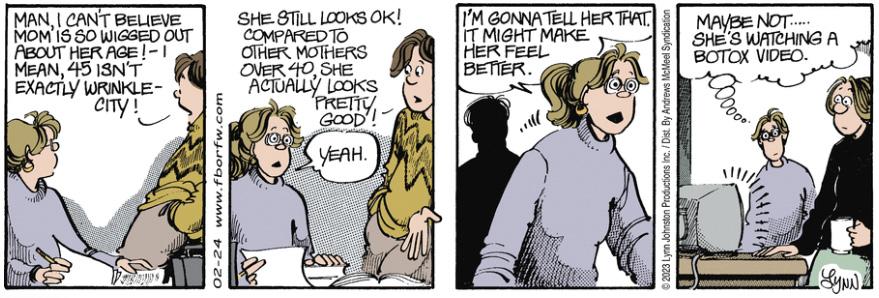













The San Juan Daily Star, the only paper with News Service in English in Puerto Rico, publishes 7 days a week, with a Monday, Tuesday, Wednesday and Thursday edition, along with a Weekend Edition to cover Friday, Saturday and Sunday.



 By THE STAR STAFF
By THE STAR STAFF
U.S. District Court Judge Laura Taylor Swain on Thursday stayed a motion to order the U.S. Trustee Office to deliver to the court reports on investigations into conflicts of interest by professionals hired by the Financial Oversight and Management Board or, in the alternative, order the Trustee to investigate the oversight board’s leading firm O’Neill & Borges (O&B) for conflict of interest.
Swain, who is overseeing Puerto Rico’s Title III bankruptcy cases, said she wanted to rule first on certain jurisdictional matters before ruling on the motion.

R&D Master Enterprises sued to disqualify O&B on Jan. 19, after a similar motion by Carlos Lamoutte, the company’s lawyer, failed because he lacked standing.

R&D said O&B had illegal undisclosed conflicts of interest because in addition to representing the oversight board, it represented a group of funds that acquired a $384 million commercial loan portfolio from Puerto Rico’s Economic Development Bank (EDB). R&D is one of the borrowers whose loans were the subject of that transaction, which the local government is trying to nullify.
“R&D Master opts to pursue the same tactics of innuendo, invective, illogical conclusions, and unsupported factual statements as to which it simply lacks any personal knowledge, to − once again − pursue its evident ultimate goal here, a declaration that the EDB Agreement is null and void ab initio,” O&B argued.
When Swain dismissed Lamoutte’s suit, she left the door open for R&D Master Enterprises to attempt to disqualify O&B because of its condition as creditor to Puerto Rico, which would prevent the court from dismissing the case for lack of standing.
Lamoutte filed a mandamus in court seeking to have the oversight board review the EDB loan contract, which, he said, the government has already declared fraudulent. He believes the oversight board has not acted because of O&B. After the lower court failed to act, the matter is before the U.S. First Circuit Court of Appeals in Boston, which has scheduled oral arguments in the case for next Thursday, March 9.
Separately, the EDB is also trying to nullify the agreement in the local courts. A hearing in the case
is slated for April.
In her ruling, Swain said the court set a briefing schedule with respect to R&D’s motion to disqualify O&B for unresolvable conflicts of interest.
Opponents have said the Title III court lacks jurisdiction to see the disqualification motion arguing, among other things, that R&D lacks standing to prosecute the disqualification motion and that the court lacks jurisdiction to adjudicate the disqualification motion. R&D filed a reply in support of the disqualification motion.
“Accordingly, the Disqualification Motion is now fully briefed and under consideration by the Court. The objections to the Disqualification Motion raise substantial threshold issues concerning the Court’s jurisdiction and Movant’s standing with respect to the Disqualification Motion. The resolution of those issues is likely to be pertinent to adjudication of the Motion,” the judge said. “As such, in the exercise of its reasoned discretion and in the interests of efficiency and judicial economy, the Court hereby stays the motion (for the U.S. Trustee) pending the Court’s consideration of the Disqualification Motion.”
Gov. Pedro Pierluisi Urrutia on Thursday passed the hot-button issue of demands for a salary increase for judicial branch employees over to the Legislature.

“When we look at all the public employees of the executive branch, and we include teachers, firefighters, correctional officers, paramedics, nurses, we include everyone, and about 70% of public servants have received salary increases in this administration,” the governor said in response to questions from the press. “All public servants have received bonuses in this administration, largely because of the efforts we have made in using the federal funds we have available.”
“The judicial branch has a demand that has to be addressed by the legislative branch. They have to submit a bill, if they have not submitted one, to the legislative branch,” Pierluisi added. “They have to claim the necessary budget increase to update their remuneration plan. They have to do it; I endorse it. For the judges, they have to resort to the legislative branch to have an adjustment made in their pay.”
The governor did not rule out taking other measures to increase the salaries of public employees.
“I support that and recognize that not all public servants have received salary increases, but the vast majority have,” he said. “In the future I do not rule out taking additional measures to continue improving pay in the public service.”
Judicial branch employees announced a demonstration for Friday at 9 a.m. on the premises of the island Supreme Court in San Juan, in protest of the lack of a fair wage increase for workers in the sector.
“The judiciary is one of the fundamental pillars of our democratic system and its employees are essential for its proper functioning,” said Amircal Gerena, a spokesman
for the employees and a sheriff assigned to the Utuado Judicial Region. “However, the workers have been facing a significant deterioration in our working conditions, especially in terms of our salary.”
He added that the employees are calling for the understanding and solidarity of citizens, since the struggle for a fair wage benefits workers in the sector and also translates into more efficient and equitable justice for all.
In recent days, Senate Bill 1106 was announced, which if approved would give a substantial salary increase to judges, something that has generated considerable displeasure among judiciary employees.
“From the Steering Committee of employees we express our concern about this situation, since we consider that this salary increase does not correspond to the economic reality of the country and is disproportionate compared to the paltry salaries received by the rest of the workers of the [judiciary],” Gerena said. “We are concerned that this increase could generate an imbalance in the salary structure of the agency, as well as potentially affect the budget allocated to other important areas of this institution.”
Resident Commissioner Jenniffer
González Colón invited communities, nonprofits and government entities to submit proposals for local or community projects, also known as Community Project Funding, for consideration in the federal government’s budget for fiscal year 2024.

“Over the past two years, I fought and secured $21.8 million for a total of 15 community projects in fiscal years 2022 and 2023,” González Colón said in a press release. “This injection will help municipalities repair roads, increase safety on the streets, and support the mission of vital organizations for our youth and low-income families, such as the Boys and Girls Clubs and Hogar Ruth. Likewise, they provide tools to our universities so that they can increase research and their academic offerings. I look forward to receiving proposals this year and working with our local authori-
ties to continue securing federal funding that directly impacts our people.”
The resident commissioner’s office will be receiving proposals through Monday, March 13.
Those interested in submitting any of their existing or future projects should familiarize themselves with eligible federal programs and their requirements to determine whether it would be appropriate to include it in the funding application.
Among the most important aspects of determining eligibility are being able to demonstrate that the project has broad community support, is justified, and -- if selected for funding -- can be implemented quickly, effectively, and in full compliance with applicable federal requirements. This includes being able to comply with the matching of funds, if necessary.
The resident commissioner’s office can answer questions sent via email to: prapprops@ mail.house.gov.
Those interested in learning more about federal programs eligible for proposals, viewing community projects funded in past years,
and other details can visit the commissioner’s website via link https://gonzalproject-funding-request-o.

 By THE STAR STAFF
By THE STAR STAFF
Resident Commissioner Jenniffer González Colón said Thursday that she is “seriously considering” seeking the New Progressive Party’s (NPP) gubernatorial candidacy for the 2024 elections.
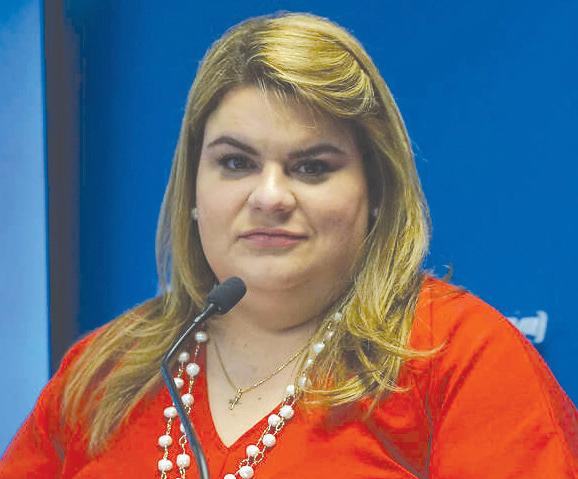
“Not to discard it? Of course,” the resident commissioner said in response to questions from the press. “This is the first time I’m seriously considering it, because there has been a serious demand from the people.”
“But those decisions can’t just be made with what people want to hear. One has to evaluate everything,” González Colón added. “There are people who think like that and people who don’t think like that. When I make decisions, I like to know that I’m doing it because people are asking for it, not because of anyone’s personal ambitions. So I’m going to do the evaluation. I’m not ruling it out; I’m seriously considering it.”
Regarding the candidates from the other parties who have already made known their interest in aspiring to the office of resident commissioner, González Colón insisted that she is not concerned about any of the names that have been announced so far.
“The position is filled and I am the resident commissioner,” she said. “There are still two years until a general election. I believe that there are people who think that by stating what their aspirations are today, they are going to get a jump on the elections, and that is not the reality. The elections are two years away and we are halfway through a term and there are people who do not focus.”
Gov. Pedro Pierluisi Urrutia, meanwhile, insisted that he is prepared and ready to seek re-election in 2024. Near Roberto Clemente Coliseum in Hato Rey several “Pierluisi Governor 2024” banners can be seen, a reminder of Sunday’s NPP General Assembly.
The Popular Democratic Party (PDP) called on Thursday for a meeting of its newly seated governing board and announced the opening of candidacies for committee presidencies in 26 municipalities.
Intending to maintain momentum, strengthen its electoral structures and accelerate the reactivation processes of voters affiliated with the party, the PDP on Thursday presented a new institutional work calendar for the coming weeks, which includes new voting in 26 municipalities, the call for the first meeting of the new governing board and a major party fundraising event.
PDP Secretary General Luis Vega Ramos, Electoral Commissioner Ramón Torres Cruz and Alternate Electoral Commissioner Jorge Colberg Toro announced the decision during a press conference held at PDP headquarters in Puerta de Tierra.
Vega Ramos said the first task will take place Saturday at the PDP to select the governing board representative of the LGBTTQI community.
“As is of public knowledge, after two draws occurred in the voting of the General Assembly for the chairs of the community base and the LGBTTIQ+ before the governing board, the PDP has said these positions would be filled in subsequent days,” Vega Ramos said. “Therefore, for these purposes -- and given the fact that one of the candidates for the chair in the base sector of faith has retired from the contest -- it would only be to select the chair of the LGBTTIQ+ community this Saturday, March 4, starting at 9 in the morning.”
In that process, he said, 40 delegates of that same sector selected in each of the representative districts will have the right to vote, according to the new PDP regulations.
Likewise, the PDP general secretary announced that the governing board will have its first formal meeting Saturday. Members will be sworn in, and they will hear a detailed report about the reorganization status and electoral issues. The board will also decide on the selection mechanism to fill the vacancy in House District 20 following the resignation of Rep. Kebin Maldonado Martiz.
PDP officials also announced the opening of the process of filing candidacies for the presidencies of the municipal committees in 26 municipalities, the vice presidency of the PDP Committee in Mayagüez, and five such seats in San Juan, according to the new electoral redistribution. The filing process will begin Friday, March 3 at 9 a.m. and will run until March 10 at 5 p.m.
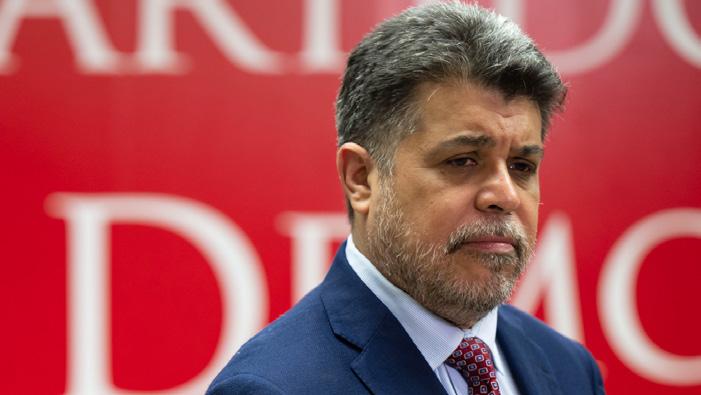
Voting for the positions will be held on Saturday, April 1 by direct voting of all voters affiliated with the PDP in those municipalities.
“This process will allow us to fill 100% of the presidencies of the municipal committees throughout the island and, in addition, will function as an electoral preparation exercise for the vote on Sunday, May 7,” said Torres Cruz, the electoral commissioner.
He added that the May 7 “electoral event will allow for the reactivation and verification of the electoral status of thousands of [PDP] voters throughout the island.”
The municipalities that will participate in the simultaneous election are: Aibonito, Barranquitas, Bayamón, Cabo Rojo, Camuy, Canóvanas, Cataño, Ceiba, Culebra, Florida, Corozal, Fajardo, Guaynabo, Humacao, Lajas, Las Marías, Manatí, Maunabo, Moca, Naranjito, Patillas, San Germán, San Lorenzo, San Sebastián, Utuado and Yauco.
Regarding the situation in Mayagüez, the officials said the reorganization process began last year and that on this occasion the vice presidency of the municipal committee will be decided through an open vote.
The officials added that in the next few days they will provide details of the voting places, training of candidates, and logistics of the event.
Deputy Speaker of the House of Representatives José “Conny” Varela Fernández condemned the absence of State Elections Commission (SEC) Alternate Chairwoman Jessika Padilla Rivera from a public hearing in which the budgetary situation of the SEC would be discussed, along with its possible effects on the upcoming election events.
The House Electoral Affairs Commission, chaired by Rep. Varela, summoned SEC Chairman Francisco Rosado Colomer in accordance with House Resolution 734, after statements made by Rosado Colomer on the economic condition of the SEC were made public.
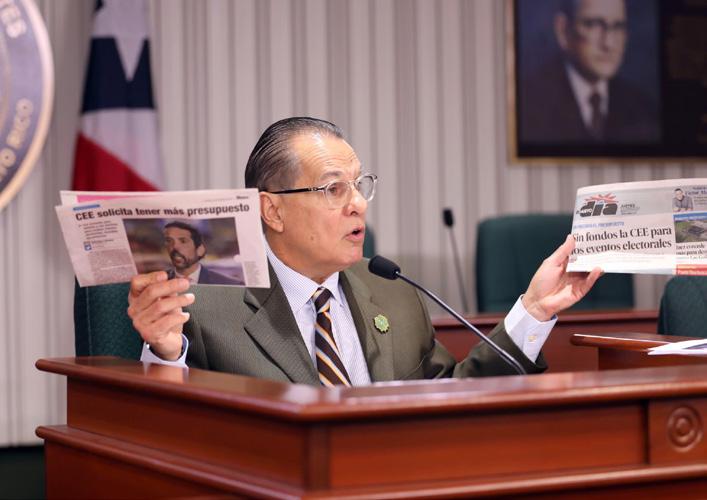
The SEC chairman had indicated, among other things, that he had not been approved for funds to carry out primaries (scheduled for June 2024), or sufficient resources for the
programming and maintenance of electronic vote-counting machines.
“Our committee summoned the chairman of the SEC more than a week ago; when he received the summons, Rosado Colomer had the courtesy to contact me and tell me that he could not attend due to commitments outside of Puerto Rico, but that his alternate chairperson, Padilla Rivera, would appear in his place,” Varela said. “Now, Padilla Rivera is absent from the hearing, claiming that she is not prepared to discuss the economic issues of the SEC.”
“If the alternate chairperson, who by law becomes chair of the SEC in case of absence of the chairman, and who does not have additional functions other than that, is not prepared to be accountable for the economic condition of the commission, then it must be questioned,” the lawmaker added.
Federal prosecutors on Thursday implemented a new voluntary self-disclosure policy for businesses that will give them benefits if they disclose criminal conduct.
U.S. Attorney W. Stephen Muldrow announced that the United States Attorney’s Office for the District of Puerto Rico (USAO-PR) implemented the new U.S. Attorney’s Offices’ (USAO) Voluntary Self-Disclosure Policy (VSD), and the jU.S. Attorney’s Offices’ Monitor Selection for Corporate Criminal Enforcement Policy (the MS-CCE Policy) released it, so it became effective immediately.
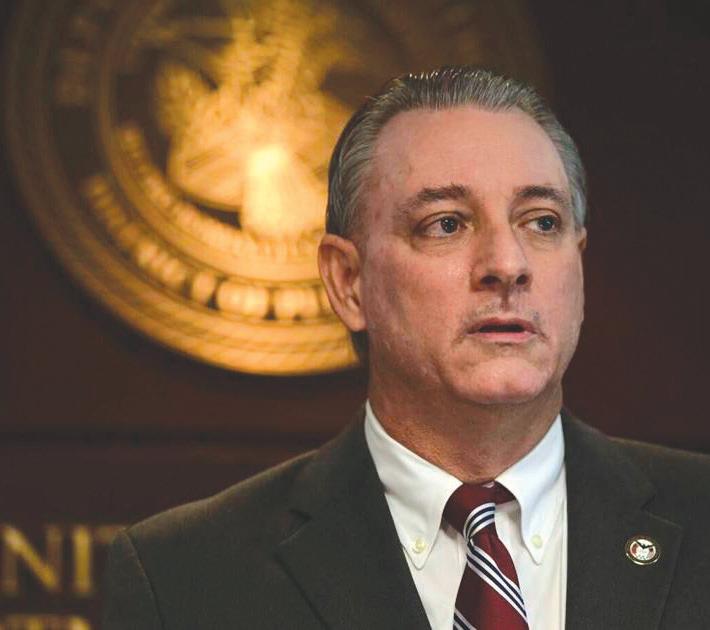
The VSD Policy details the circumstances under which a company will be considered to have made a voluntary self-disclosure (VSD) of misconduct to the USAO, and provides transparency and predictability to companies and the defense bar concerning the concrete benefits and potential outcomes in cases where companies voluntarily self-disclose misconduct, fully cooperate and timely and appropriately remediate.
The goal of the VSD policy is to standardize how VSDs are defined and credited by USAOs nationwide and incentivize companies to maintain effective compliance programs capable of identifying misconduct to expeditiously and voluntarily disclose and remediate misconduct to cooperate fully with the government in corporate criminal investigations.
The VSD policy was developed under the Deputy Attorney General’s Sept. 15, 2022 memorandum, “Further Revisions to Corporate Criminal Enforcement Policies Following Discussions with Corporate Crime Advisory Group” (Monaco Memo), which directed each Department of Justice (DOJ) component that prosecutes corporate crime to review its policies on corporate voluntary self-disclosure and, if there was no formal written policy to incentivize self-disclosure, draft and publicly share such a policy.
Under the new VSD Policy, a company is considered to have made a VSD if it becomes aware of misconduct by employees or agents before that misconduct is publicly reported or otherwise known to the DOJ, and discloses all relevant facts known to the company about the misconduct
to a USAO in a timely fashion before an imminent threat of disclosure or government investigation.
A company that voluntarily self-discloses as defined in the policy and fully meets the other requirements of the policy by -- in the absence of any aggravating factor -- fully cooperating and timely and appropriately remediating the criminal conduct (including agreeing to pay all disgorgement, forfeiture, and restitution resulting from the misconduct), will receive significant benefits, including that the USAO will not seek a guilty plea; may choose not to impose any criminal penalty, and in any event will not impose a criminal penalty that is greater than 50% below the low end of the U.S. Sentencing Guidelines (USSG) fine range; and will not seek the imposition of an independent compliance monitor if the company demonstrates that it has implemented and tested an effective compliance program.
The VSD Policy identifies three aggravating factors that may warrant a USAO seeking a guilty plea even if the other requirements of the VSD policy are met: (1) if the misconduct poses a grave threat to national security, public health or the environment; (2) if the misconduct is deeply pervasive throughout the company; or (3) if the misconduct involved current executive management of the company. The presence of an aggravating factor does not necessarily mean that a guilty plea will be required; instead, the USAO will assess the relevant facts and circumstances to determine the appropriate resolution. If a guilty plea is ultimately required, the company will still receive the other benefits under the VSD policy, including that the USAO will recommend a criminal penalty of at least a 50% and up to a 75% reduction off the low end of the USSG fine range, and that the USAO will not require the appointment of a monitor if the company has implemented and tested an effective compliance program.
In cases where a company is being jointly prosecuted by a USAO and another DOJ component, or where the misconduct reported by the company falls within the scope of conduct covered by VSD policies administered by other DOJ components, the USAO will coordinate with, or, if necessary, obtain approval from, the DOJ component responsible for the VSD Policy specific to the reported misconduct when
considering a potential resolution. Consistent with relevant provisions of the Justice Manual and as allowable under alternate VSD policies, the USAO may choose to apply any provision of an alternate VSD policy in addition to, or in place of, any provision of its policy.
The Attorney General’s Advisory Committee (AGAC), under the leadership of U.S. Attorney for the Southern District of New York Damian Williams, requested that the White Collar Fraud Subcommittee of the AGAC, under the leadership of U.S. Attorney for the Eastern District of New York Breon Peace, develop policies in response to the Deputy AG’s memo. The VSD Policy announced Thursday was prepared by a corporate criminal enforcement policy working group composed of U.S. attorneys from geographically diverse districts, including U.S. Attorney Peace and seven others.
Assistant U.S. Attorney Amanda Riedel, the white collar crimes coordinator for the Executive Office for U.S. Attorneys, also participated in the development of the VSD Policy.
One of President Joe Biden’s most ambitious proposals — a $400 billion program to forgive student loan debt for 40 million Americans — could become the latest victim of a legal tug of war with the Supreme Court over the powers of the presidency.
Conservative justices on the court signaled Tuesday that they are deeply skeptical that Biden has the power to wipe out such a vast amount of student debt. In oral arguments, several justices said they believed a program that costs so much and affects so many people should have been more explicitly approved by Congress.
It was not the first time the court has suggested that Biden overstepped his authority, but the case has the potential to curtail Biden’s ambitions just as newly empowered Republicans in the House have vowed to block his every move in Congress.
During Biden’s first two years in office, the court has blocked him from enacting key parts of his agenda, including sweeping measures to address climate change, vaccine requirements at large companies and a ban on evictions during the pandemic.
In each case, the court’s conservative majority said the president needed clear congressional approval to pursue such major policies.
The court’s decision on whether to block the student loan program as well, which is likely to come by summer, will have a vast impact on millions of borrowers who have struggled to pay back their loans.
And it will set additional legal precedents, potentially defining new limits for presidential power.
The ruling could have other broad political implications, forcing Biden and his allies to reshape their efforts to court one of the Democratic Party’s most important constituencies ahead of the 2024 campaign: young people.
When Biden announced his plan to forgive federal student loans in August, he and his political strategists envisioned being able to triumphantly declare that he had made good on his promise to borrowers that they could now “crawl out from under that mountain of debt.”
Instead, the president may have to face the voters with a very different message: that despite his best efforts, student debt relief was thwarted by Republicans who blocked his policy at the Supreme Court.
Asked on Wednesday whether he was confident that the court would rule in the administration’s favor, Biden said: “I’m confident we’re on the right side of the law. I’m not confident about the outcome of the decision yet.”
The White House is not conceding defeat. In court on Tuesday, lawyers for Biden’s administration argued that Congress had already given the secretary of education the authority to forgive student debt.
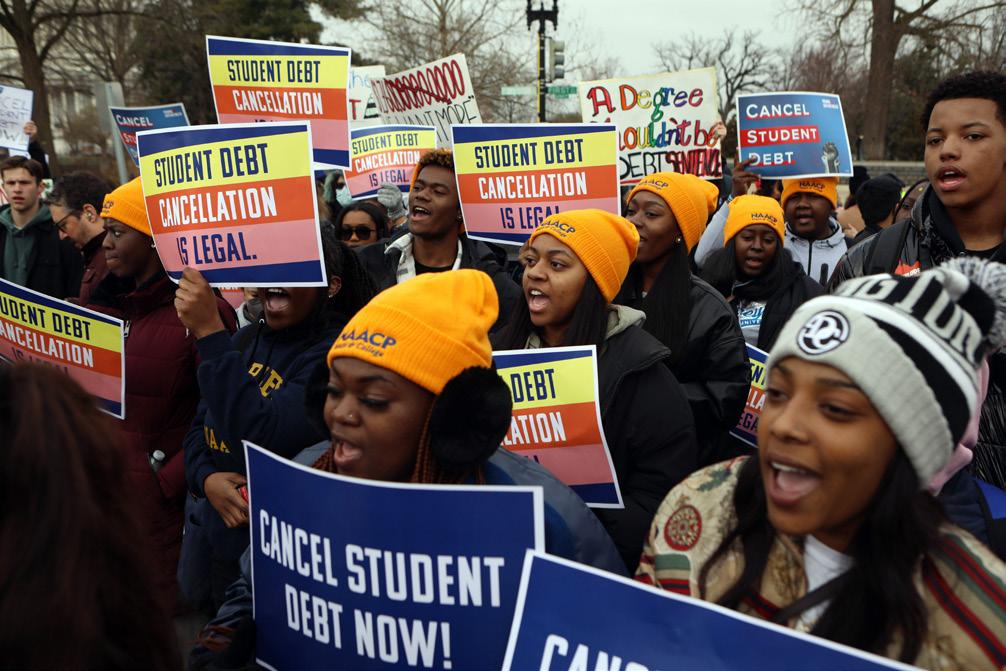
But Biden’s team has already shown its willingness to use the issue for its own political advantage, even if the best it can do is blame Republicans for stopping the plan.
Miguel A. Cardona, the secretary of education, on Tuesday sent an email to tens of millions of Americans who had signed up for relief.
“While opponents of this program would deny relief to tens of millions of working- and middle-class Americans,” Cardona wrote in the email, “we are fighting to deliver relief to borrowers who need support as they get back on their feet after the economic crisis caused by the pandemic.”
If the court blocks the program, the administration can continue to use the email list to communicate with millions of potential voters about why they are not getting the relief that Biden and his team had promised.
Max Lubin, the CEO of Rise, a group that has advocated for student debt relief, said the president has a good argument to make if Republicans succeed in blocking his debt relief program.
He said the White House could send a message that “you have an alternative in us and we have your back.”
Lubin added: “I think that’s a really powerful message to send to 25-year-olds.”

Last summer, when he announced his plan, Biden said student loan forgiveness was critical because “an entire generation is now saddled with unsustainable debt in exchange for an attempt, at least, at a college degree.”
But without a large congressional majority to pass such Democratic priorities, the president has repeatedly turned to executive action, prompting legal objections from his Republican opponents.
Those objections have made their way to a Supreme Court, whose membership now includes six conservative justices and three liberal ones. That has left the president on the losing side of several significant cases.
The Biden administration’s fraught relationship with the Supreme Court has its roots in a case in which the justices ruled against President Donald Trump, as Chief Justice John Roberts said during Tuesday’s arguments.
In that 2020 case, it was liberals who urged the Supreme Court to prevent Trump from abruptly ending an Obama-era program from 2012 that protected about 700,000 young immigrants from immediate deportation.
“The case reminds me of the one we had a few years ago under a different administration where the administration tried acting on its own to cancel the Dreamers program, and we blocked that effort,” Roberts said. “And I just wonder, given the posture of the case and given our historic concern about the separation of powers, you would recognize at least that this is a case that presents extraordinarily serious, important issues about the role of Congress?”
That case was decided by a 5-4 vote, with the chief justice joining what was then a four-member liberal wing to form a majority. In dissent, Justice Clarence Thomas predicted that subsequent administrations would face similar legal hurdles.
“It has given the green light,” he wrote of the court, “for future political battles to be fought in this court rather than where they rightfully belong — the political branches.” Biden’s struggles over the past two years — including in this week’s student loan case — suggest that Thomas was right in his prediction. After rejecting Trump’s executive authority in 2020, the court is now doing the same for Biden.
One day in 2017, Mukaddas Saipova, of Tashkent, Uzbekistan, saw her son — whom she knew as helpful, loving and kind — on a television news broadcast. She fainted, an ambulance came and she stayed in a hospital for a week.
Her son, Sayfullo Saipov, had just committed the deadliest terrorist attack in New York City since 9/11.
Saipova told that story through an interpreter to a federal jury in Manhattan on Wednesday, the final day of testimony during her son’s trial. The same jurors in January convicted Saipov, a 35-year-old native of Uzbekistan, of using a truck to kill eight people and injure many others on the West Side bike path on Halloween 2017. That jury is now weighing whether to sentence Saipov to life in prison without the possibility of release — or whether instead to sentence him to death.
The death penalty phase began last month, with prosecutors arguing that Saipov was too dangerous for prison, citing threats he has made while behind bars for the past five years.
“He is still threatening to eliminate people in prison, threatening to slit the throats of correction officers,” Amanda Houle, a federal prosecutor, said during her opening statement.
The jury also heard from numerous victims and relatives of those killed in the attack. Six of the eight people who died were tourists from Argentina and Belgium; the others were Nicholas Cleves, 23, a software engineer from Manhattan, and Darren Drake, 32, a financial worker from New Jersey.
The defense sought to humanize Saipov, showing childhood photographs and presenting testimony from several relatives, including his father, uncle, two sisters and a grandfather, in addition to his mother. The jury also heard from a terrorism expert who explained how powerful Islamic State propaganda is and why the group targets people from Uzbekistan, a predominantly Muslim nation in Central Asia that was formerly part of the Soviet Union.
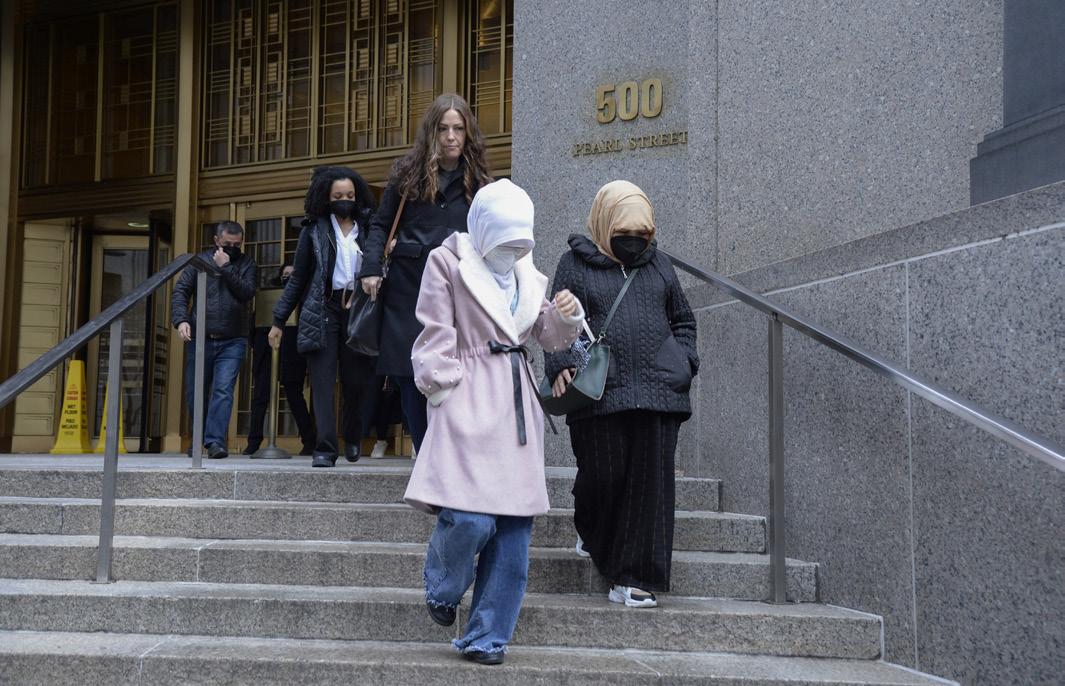
“His past could not have predicted his present,” one of Saipov’s lawyers, David Stern, said in his opening statement.
‘Tired eyes’
Saipova recalled talking for hours with her son as he drove long distances as a trucker. She visited him in the United States several times after he won the immigration lottery. The first time was 2015, five years after he left Uzbekistan. “I was very anxious to see him,” she testified.
The third time she visited, in 2017, she grew worried, she said. “He looked tired. His eyes were tired,” Saipova testified. “I thought it would be great if he left and he came to Tashkent.”
He never did.
“If I insisted him to come with me,” she said, “maybe this wouldn’t happen.”
Saipova wasn’t the only relative to visit. Saipov’s grandfather Sobit Saipov said through an interpreter that he saw his oldest grandson in the United States several times: when Saipov got married and for the births of each of his three children.
During later visits, Sobit Saipov grew concerned about changes in his grandson’s appearance. “He grew a long beard, and it was suspicious for me,” he said.
Saipov told his grandfather he simply
wanted to look older.
Sobit Saipov said he didn’t have any other choice than to believe his grandson. Stern asked whether he worried that the growing of the beard might presage a heinous attack.
“Who would imagine that kind of thing?” Sobit Saipov said through tears. “The person who was raised by me, I can’t believe that person would do something like this.”
Saipov voraciously consumed Islamic State propaganda before the attack. Noah Tucker, an expert on ISIS in Central Asia, told the jury that the terrorist group’s recruitment of Uzbeks was “remarkably successful.”
Uzbekistan, east of the Caspian Sea and a stop on the Silk Road, was part of the Soviet empire from the early 20th century to 1991, Tucker testified. Under Josef Stalin, religious leaders were sent to labor camps, where many perished.
Even after Uzbekistan gained its independence, it remained an authoritarian country. Tucker said that provided an opening for the Islamic State group, which promised to re-establish a religious caliphate.
For Uzbeks who leave the country, “Islam often becomes, in that situation, your primary identity, whether you sort of knew that before or not,” Tucker said.
“It also is a period where many Uzbek
migrants begin to try to learn about what it means to be a Muslim that maybe they didn’t know before,” Tucker said. “Even simple things, like when to pray during the five daily prayers and how to wash yourself.”
Many such migrants encounter ISIS propaganda, he said, and recruiters contact them through online profiles. Tucker described creating a fake Facebook profile using a typical Uzbek name and using it to join a number of émigré groups.
“It took less than 24 hours before a recruiter was contacting that profile,” Tucker testified.
Staying silent
During the guilt phase of the trial, Saipov chose not to testify in his own behalf.
On Wednesday, Judge Vernon S. Broderick of U.S. District Court offered Saipov another chance to address the jury. He declined.
On Wednesday afternoon, before the defense rested its case, the judge repeated his question to Saipov: “I’m going to ask you again as you sit here right now: Do you intend to testify?”
It would be his last opportunity, the judge indicated.
Saipov again said no.
What’s next?
A prosecutor and a defense lawyer are each expected to make closing arguments on Tuesday. The judge will instruct the jurors on the law. Then, the 12 members of the panel will begin their deliberations.

Two men were charged with misdemeanors earlier this week after they entered a private property in Nebraska, found a bald eagle perched on a tree and shot it at close range before hauling the large protected bird in their vehicle with the intent to eat it later, authorities said.

The men, Ramiro Hernandez-Tziquin and Domingo Zetino-Hernandez, both 20, were charged with unlawful possession of an eagle, according to the Stanton County Sheriff’s Office. Although they apparently might not have known they had killed a bald eagle, the men, who are originally from Honduras and do not speak English, could face additional federal charges as officials investigate, authorities said.
Hernandez-Tziquin and ZetinoHernandez, who live in Norfolk, Nebraska, could not be reached Wednesday night, and it was not immediately clear if they had lawyers.
The rare killing of a bald eagle, America’s national bird, jolted local authorities, including the sheriff in Stanton County, Mike Unger, who said that in his more than 40 years of law enforcement work, he had never handled such a case in his jurisdiction of about 5,800 residents. The resurgence of the bald eagle, which was at risk of extinction 60 years ago when only about 417 nesting pairs were known to exist, is considered one of the greatest U.S. conservation stories.
Unger said in an interview that he received a call about 4 p.m. from a resident who reported that a car was driving through their private field near the Wood Duck State Wildlife Management Area, a public land where residents occasionally hunt.
Deputies then drove to the property,
which is encircled by trees and hidden deep along a dirt path in Stanton County, about 100 miles northwest of Omaha.
The deputies found Hernandez-Tziquin and Zetino-Hernandez, who told them that they spoke only Spanish, Unger said, prompting the deputies to use a translation app to communicate with the men.
They told the deputies that they had shot a vulture, Unger said.
“Well, can we see that vulture?” one of the deputies asked the men, according to the sheriff.
The men said yes and opened the trunk of their car, revealing an air rifle, a BB pistol and a North American bald eagle, splayed and clearly dead.
Hernandez-Tziquin and ZetinoHernandez told the deputies that “they intended to take it home and cook it and eat it,” Unger said, adding that it was unclear if the men knew that killing the eagle was a violation of federal law. He also said that it was possible that the translation app they had used incorrectly stated “vulture” in their communication with deputies.

“I can’t tell you what their demeanor was at that time,” he said. “Did they or did they not know it was a North American bald eagle? I have no way of knowing. They are Honduran citizens.”
Deputies contacted the Nebraska Game and Parks Commission, which took custody of the eagle and the rifle that the men had used to kill it. The men were not jailed Wednesday because their charge was a misdemeanor.
The U.S. Fish and Wildlife Service did not immediately respond to calls seeking comment Wednesday night, and a spokesperson for the commission declined to discuss the case in an interview Tuesday.
Joel Jorgensen, the spokesperson, said that eagles across the country, including the 400 to 600 bald eagles in Nebraska, “are really doing quite well.”

The comeback of the bald eagles is stunning, considering they were nearly wiped out by the widespread use of the synthetic insecticide DDT. A ban on DDT in 1972, along with conservation efforts, helped the population to rebound. The bald eagle was removed from Endangered Species Act protection in 2007, and its estimated population grew to 316,700 by 2019.
But recently, the species has faced a new threat: lead poisoning.
Researchers found last year that of the 1,200 eagles they tested, nearly half had been exposed repeatedly to lead, which
can lead to death and slow population growth. Scientists believe that the primary source of the lead is ammunition used by hunters, who shoot animals that the eagles then scavenge.
While there have previously been rare reports of bald eagles being hunted in the United States, the killing Wednesday still came as a surprise to deputies at the sheriff’s office.
Unger said there are perhaps 10 or 15 bald eagles that have been gliding through the skies of Nebraska’s Stanton County this year, delighting locals who look up to search for them in the winter.
“A lot of people enjoy seeing them,” he said. “So I know a lot of people locally who are very upset about it.”
ACalifornia panel on Wednesday denied parole for Sirhan B. Sirhan, the man convicted in the 1968 assassination of Sen. Robert F. Kennedy, in its first review of the case since Gov. Gavin Newsom decided last year that Sirhan, 78, should not be released.
The parole board’s latest decision, which followed a hearing via videoconference from the state prison in San Diego, where Sirhan has been held, was the second time in three years that Sirhan’s release had been considered. He has spent more than a half-century behind bars for shooting Kennedy, then a candidate for president, inside the Ambassador Hotel in Los Angeles at the end of a campaign appearance in 1968. At the time, Sirhan was 24.
His lawyers have argued that he is not a danger to the public and should be released. In 2021, a panel of the parole board agreed. But after an extraordinary chain of events, the governor overruled the panel last year, charging that Sirhan had not yet been rehabilitated.

On Wednesday, after Sirhan’s 17th parole hearing, the new recommendation was made by a commissioner and a deputy commissioner who were not part of the review panel in 2021. Newsom had no comment.
The assassination of Kennedy stunned the nation, occurring as Americans were grappling with deep generational and cultural divisions, the Vietnam War and the movement for civil rights. Kennedy — the brother of a beloved president who, only a few years before, had also been assassinated — had just won the Democratic presidential primary election in California.
Sirhan, a Jerusalem-born Palestinian who had emigrated to the United States from Jordan, shot Kennedy as he walked through the hotel’s pantry. He confessed almost immediately. Initially, he was convicted of first-degree murder and assault with intent to murder and was sentenced to death, but that sentence was later commuted to life with the possibility of parole.
In a television interview from prison in 1989, Sirhan said that he had killed Kennedy because he felt betrayed by the senator’s proposal during the campaign to send military planes to support Israel. Later, however, he said he did not remember the shooting.
By 2021, California law required the parole board, when making a determination on releasing an inmate, to consider the inmate’s advanced age and his relative youth at the time a crime was committed. After 15 prior denials, a panel of commissioners granted him parole that year.

They noted then that Sirhan had improved himself by taking classes in prison. Two of Kennedy’s sons had
also urged leniency.
But most of the family was adamant that Sirhan remain behind bars and pleaded with Newsom to exercise his power under California law to reject the panel’s recommendation. In January 2022, after more than four months of review, the Democratic governor — who has long spoken of Kennedy as a role model — granted that plea.
“After decades in prison, he has failed to address the deficiencies that led him to assassinate Sen. Kennedy,” the governor wrote last year. “Mr. Sirhan lacks the insight that would prevent him from making the same types of dangerous decisions he made in the past.”
Sirhan’s lawyer, Angela Berry, has since asked a Los Angeles Superior Court judge to reverse Newsom’s 2022 parole denial. With that petition pending, she said Wednesday that she believed the panel’s latest decision had been influenced by the governor’s rejection last year.
“I don’t know how you come to an opposite conclusion,” Berry said, noting that since 2021, Sirhan had undergone even more counseling and had added to his long record of good behavior.
“He’ll be 79 this month,” she said. “He’s trying to do the right thing. He wants to help his younger brother, who is almost blind. They want to live together for their remaining years.”
But she said that the Kennedy family and its lawyers had argued strenuously at Wednesday’s hearing that Sirhan still posed a risk to society and that the panel had “a different dynamic.”
“With the governor’s power to reverse the board,” she said, “I think it makes it difficult for any politically sensitive person to be released.”
In a sweeping decision, an administrative judge in New York ruled earlier this week that Starbucks had violated federal labor law dozens of times in responding to a union campaign in the Buffalo area shortly after the campaign began roughly 18 months ago.
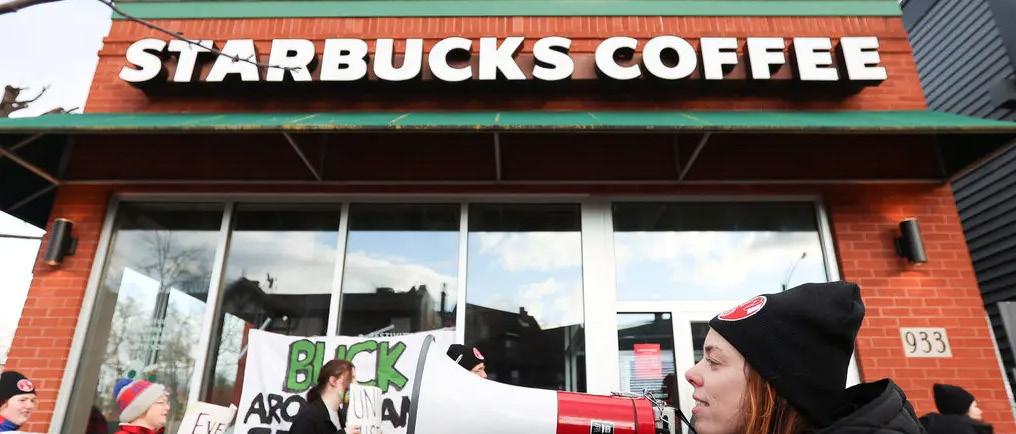
Michael A. Rosas, a judge for the National Labor Relations Board, concluded that Starbucks had illegally monitored, disciplined and fired employees engaged in union organizing; added workers to stores to dilute support for the union; and promised new benefits to workers in an attempt to defuse support for the union.
The ruling mandates the reinstatement of seven Buffalo-area workers who the judge concluded were unlawfully discharged from the company, and back pay and damages to more than two dozen workers who the judge concluded had suffered retaliation that affected their compensation, such as a reduction of hours.
In addition, the judge ordered Starbucks CEO Howard Schultz to read or be present for the reading of a notice, more than 10 pages long, promising to refrain from committing a series of labor law violations in the future, and to make and distribute a video of the reading.
Because of the company’s “egregious and widespread misconduct demonstrating a general disregard for the employees’ fundamental rights,” Rosas wrote, it was necessary to issue a broad order requiring Starbucks “to cease and desist from infringing in any other manner on rights guaranteed employees.”
“This is truly a historic ruling,” Gary Bonadonna Jr., the regional head of Workers United, the union organizing Starbucks, said in a statement. “We will continue to fight and hold billionaires like Howard Schultz accountable for their actions. We will not rest until every Starbucks worker wins the right to organize.”
The ruling can be appealed to the labor board in Washington, and to federal court after that, and Starbucks indicated that it might do so. “We believe the decision and the remedies ordered are inappropriate given
the record in this matter and are considering all options to obtain further legal review,” the company said in a statement.
Starbucks’ response to the union campaign has gotten heightened scrutiny recently. Earlier on Wednesday, Sen. Bernie Sanders, I-Vt., announced that he planned to hold a vote next week on whether to subpoena Schultz before the Senate labor committee. Schultz had declined an earlier invitation from Sanders to testify about the company’s actions during the union campaign.
Last month, a federal judge ordered the reinstatement of a Michigan worker who was involved in union organizing when the company fired her in April.
The organizing campaign notched its first victory in Buffalo in 2021. Since then, more than 280 of the roughly 9,300 corporate-owned Starbucks locations in the United States have unionized. The ruling covers the period from August 2021 to July 2022, by which point the campaign had spread from the Buffalo area to dozens of sto -
res nationwide.
In the early months of the campaign, Starbucks workers complained that executives and other company officials were converging on Buffalo in an attempt to undermine their unionization effort.
Rosas found that Starbucks had violated labor law by “having high-ranking company officials make repeated and unprecedented visits to stores in order to more closely supervise, monitor or create the impression that employees’ union activities are under surveillance.”
He also ordered the company to bargain with the union at a Buffalo-area location where the union lost an election in December 2021, concluding that the scope of the violations at the store tainted the vote and made a rerun of the election an “insufficient” remedy.
It is rare but not unprecedented for a judge to effectively order in a union upon concluding that it had support among workers but that a fair vote is nearly impossible.
Podemos ayudarte a realizar:

• Reclamaciones
• Transferencias y/o retiros de cuenta IRA
• Información o adquisición de seguros

Nuestra agencia de seguros continua operando via remoto para beneficio de nuestros socios.
Puedes obtener una cubierta de seguro que puede ayudarte económicamente, si estuvieras hospitalizado o en gastos funebres.
¡TODO DESDE LA COMODIDAD DE SU HOGAR!
 `By JAN HOFFMAN
`By JAN HOFFMAN
Over the past month in a southeast Georgia courtroom, three generations of families testified about how their lives had been savaged by addiction to prescription opioids: A young man recounted huddling in a locked room with his brothers, while his father, waving a shotgun, ransacked the house for pills. A mother described holding her granddaughter, while her dopesick daughter rammed a car into the house. A young woman told of her rape at age 14 by a drug dealer, while her mother nodded out.
They ticked off overdose deaths: grandparents, parents, siblings, spouses. And a baby, whose mother injected Dilaudid throughout her pregnancy and who shook uncontrollably throughout his monthlong life.
It was the first lawsuit to come to trial brought by individual victims of the opioid epidemic against pharmaceutical companies. On Wednesday afternoon, the victims lost.
After deliberating barely a day and a half, the jury found that the companies — two of the country’s largest medical distributors, McKesson and Cardinal Health, and a third regional one — were not liable. The plaintiffs — 21 relatives from six families — had filed suit under a rarely used state law that permits relatives of people addicted to drugs to sue drug dealers.
The outcome of the case underscores a startling reality. The pharmaceutical industry has committed more than $50 billion so far to settle lawsuits over its role in the opioid epidemic, but the families of people who died or who still struggle with addiction have gotten almost none of it.
The money pledged by manufacturers (like Purdue Pharma and Johnson & Johnson), distributors (AmerisourceBergen as well as McKesson and Cardinal) and national pharmacy chains (like CVS and Walgreens) is earmarked for prevention and treatment programs in the states, municipalities and tribes that filed thousands of opioid-related cases. Those cases were propped up to a large degree by the suffering and statistics of families hit by the opioid crisis.
“It has been so hard to explain to families over the years why a lawsuit against the manufacturers, never mind distributors, is so difficult to win,” said Jayne Conroy, a lawyer who reached a settlement with Purdue Pharma for 5,000 people who took OxyContin as prescribed but became addicted, and is now a lead lawyer for many local governments in the nationwide opioid litigation.
The Georgia trial provided a brutal and often unbearably intimate picture of how prescription opioids — and eventually, heroin, meth and fentanyl — crushed entire households. But the proceedings also showed how challenging it is to draw a direct line between a company in a complex distribution chain and the misfortunes of individual people.
The Georgia law says that relatives of drug users can sue for harms they endured from the “individual drug
abusers.” Even so, defense lawyers for the distributors often turned the case into a referendum on addiction, saying that relatives suffered at the hands of people who chose pills over family.
F. Lane Heard III, a Cardinal lawyer, noted that Brandy Turner, a mother of four daughters, took methadone from her mother in payment for doing household chores and watched her father sell drugs. Turner stole from her children and often left them with a great-grandmother who beat them until blood ran down their legs.
“How do you hold a wholesale distributor responsible for that kind of history and activity?” Heard asked the jurors.
Repeatedly during cross-examination and in closing arguments, he and others bore down on personal responsibility.
“Brandy Turner always had a choice,” Heard said, noting that on the stand, her daughters, aunt and sister, exposed to the same turmoil, explicitly said they had chosen not to take drugs.
The trial took place in Brunswick, Georgia, a small coastal city surrounded by farmland and one-store towns, in an area that became well known as a hot spot along the “blue highway”— so-named for the color of oxycodone 30 milligram pills.
The lawsuit, first filed in 2019, asserted that for more than a decade, the distributors eagerly shipped to five local pharmacies, which ordered vastly outsize quantities of opioids for the tiny communities, often dispensing them in dangerous combinations. The lead plaintiff was Joseph Poppell, a paramedic firefighter captain whose parents died from overdoses and who rescued his nieces from foster care, while his sister, their mother, remained addicted.
Under the Georgia law, called the Drug Dealer Liability Act, the plaintiffs had to prove, by clear and convincing evidence, a high bar that the distributors violated state and federal laws regulating controlled substances.
Then they had to show that an “individual drug abuser” in a family had filled opioid prescriptions at pharmacies to which the distributors shipped. Finally, they had to show that the relatives were harmed by the person who used those drugs.
The plaintiffs’ chief lawyer, Jim Durham, a former acting U.S. attorney for the Southern District of Georgia, argued that all three companies had sidestepped their regulatory obligations.
“They picked this community to dump and flood their drugs,” Durham said in closing arguments. “They found willing pharmacies, and they turned on the faucets. Why? Because there were millions of dollars of sales to be had.”
Distributors, he continued, ignored flame-red flags: notorious “Trinity” prescriptions — such as OxyContin, Xanax and muscle relaxers — written by out-of-state pill mill doctors 100 miles away; customers paying in cash; pharmacy parking lots filled with people swapping and selling pill baggies.
In 2011, for example, Durham said, Cardinal sold 290,000 oxycodone pills to Darien Pharmacy. Darien, Georgia, has a population of about 1,700.
Even though companies presented increasingly tough monitoring policies to the Drug Enforcement Administration, Durham said, they did not act on them.
Lawyers for the companies argued that the opioid thresholds were established each year by the DEA. The companies, they said, were prohibited from examining a pharmacy’s prescribing data for glaring problems. In hindsight, they added, given what is now known about opioids’ powerful addictive properties, perhaps the distributors would have been much quicker to challenge the pharmacies’ outsize requests. But for years, doctors were urged to aggressively treat pain with prescription opioids. And, the lawyers said, it was not the responsibility of wholesale distributors to second-guess prescribers or ferret out bad ones.
The company lawyers cited many other factors to blame for the families’ incontrovertible suffering: street drug dealers; alcohol; other drugs; the Sacklers, owners of Purdue Pharma; and greedy pharmacists and doctors. (Before trial, the independent pharmacies settled for an undisclosed amount. Many of the pill mill doctors lost their licenses and served federal sentences.)
And the lawyers emphasized each family’s own patterns of dysfunction, including generational substance abuse, sexual predation, domestic violence, mental health disorders and the women’s terrible choices in male companionship.
In a statement, McKesson called the jury’s verdict “the right outcome based on the law and evidence presented at trial.” Cardinal said the decision “confirms that a law meant to apply to street dealers of illegal drugs cannot be used in a misguided attack on DEA-registered wholesale distributors of FDA-approved medications.”
Lawyers for the plaintiffs did not respond to requests for comments.
Woodbine Pharmacy in Woodbine, Ga., Feb. 24, 2023.Global stock markets were mixed on Thursday, as investors weighed indicators of economic strength with rising bond market costs and expectations of more global interest rate hikes.

After initially sagging, European shares rose 0.5%as euro zone inflation numbers justified what is widely expected to be another 50 basis point hike in the European Central Bank’s already decade-high rates this month.
Consumer price inflation in the 20 countries sharing the euro currency eased to 8.5% in February from 8.6% in January on lower energy prices, a barely noticeable move and above the 8.2% economists polled by Reuters had expected.
It was not enough to lift the euro or stall the dollar’s rise though [FRX/], with Wall Street stocks lacking clear direction as U.S. jobless claims numbers fell again and a measure of the price of labor increased at a 3.2% annualized rate last quarter.

The Dow Jones Industrial Average rose 0.37%, lifted by Salesforce (NYSE:CRM) Inc, whose shares jumped about 11% after the cloud-based software provider gave an upbeat fullyear profit forecast and doubled its share repurchase program.
The S&P 500 lost 0.1% and Nasdaq Composite dropped 0.37%, as Tesla (NASDAQ:TSLA) Inc fell around 6%. The company said it would cut vehicle assembly costs by half in future generations of cars, but Chief Executive Elon Musk did not unveil a much-awaited small, affordable electric vehicle.
MSCI’s broadest index of world shares fell 0.2% to around seven-week lows.
Stock and bond markets in recent weeks have been driven by different factors, said Kevin Gardiner, global investment strategist at Rothschild & Co. The chief concern in stocks is the expectation of pressured corporate profits, while bonds are sensitive to inflation and rate expectations.
“The economic impact of tightening remains a puzzle. Profitability might not be that fragile, at least, not yet,” he said.
Overnight, both benchmark government bonds and shares had taken a blow, as inflation indicators from Germany and the United States reinforced expectations interest rates would go higher and stay there for longer.

Germany’s 2-year government bond yield rose to its highest since October 2008.
In the United States, manufacturing activity contracted for a fourth-straight month in February, but a gauge of prices for raw materials increased last month, stoking concerns that inflation would remain stubborn.
“Economic data has surprised to the upside,” said Steven Oh, global head of credit and fixed income at PineBridge Investments. Any unexpected result in the data would drive policymakers to be more aggressive, and that’s reset market expectations, he said.
Benchmark 10-year Treasury yields hit a fresh fourmonth high of 4.085%, while two-year yields also advanced to 4.916%, around a fresh 16-year high.
Investors still mostly foresee the Fed raising rates by 25 basis points at its next meeting later this month, but expectations of a larger 50 basis points hike have increased.

The probability that the Fed’s policy rate, currently set in the 4.5% to 4.75% range, could peak above 5.5%, stood at 53%, compared with 41.5% on Feb. 28, according to the CME Fedwatch tool.

After years of pandemic-forced cancellations, Athens last weekend hosted carnival, and scores of Greeks flocked in to celebrate. Vaios Vlachos and Daphne Brella, a couple who had dressed up as marble busts, were among them before they rushed to catch a night train Tuesday that would get them home in time for work the next morning.
But shortly before midnight, the train that they and hundreds of others were traveling on collided with a freight train near Tempe, in northern Greece, killing 57 people, the worst train crash in the country’s history. Vlachos, 32, was still missing as of Wednesday night, and Brella was in an intensive care unit.
“It’s wrenching,” said Vlachos’ brother, Evangelos, adding that, as time passes, he loses hopes of finding his brother alive. “Every hour feels like poison.”
Greece is expected to hold a general election in the coming weeks, and although it was unclear if or how the accident would influence the voting, there were signs that the crash was reverberating in a country that has the worst train safety record in Europe.
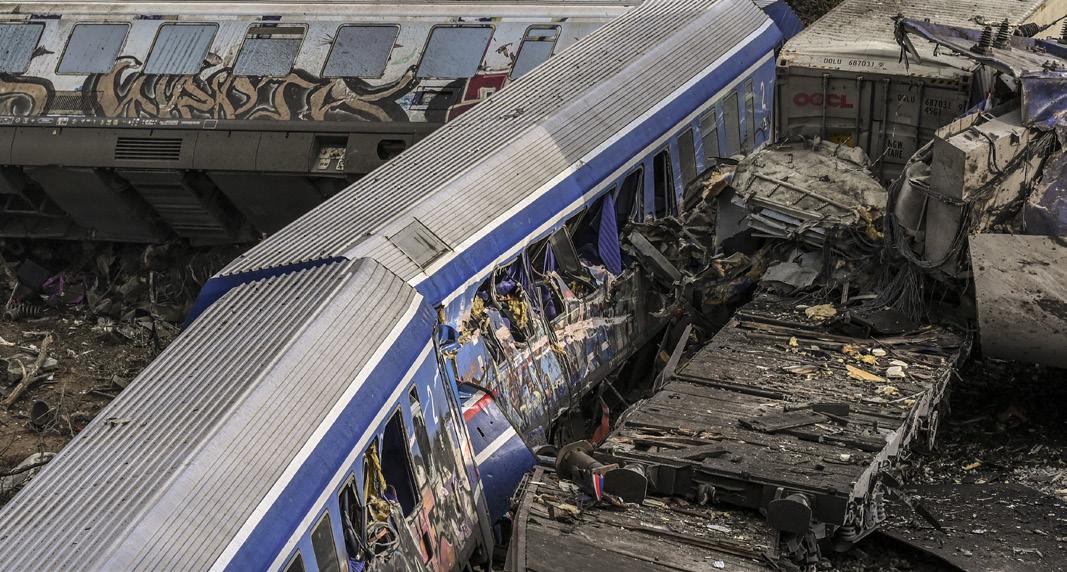
On Wednesday in Athens, protesters clashed with police outside the headquarters of Hellenic Train, the company responsible for maintaining Greece’s railways. Demonstrations were also reported in Larissa, near the site of the crash, and Thessaloniki, to the north. The Panhellenic Federation of Railway Employees declared a 24-hour strike, so no trains were running Thursday in Greece.
The passenger train that crashed was carrying about 350 people, and 57 are still hospitalized, including some in intensive care. It is unclear how many people are unaccounted for.
The search for survivors was continuing at the crash site, with cranes lifting out sections of two carriages so that rescuers could search underneath, an already difficult operation that was complicated by steady rainfall.

The circumstances that led to the two trains traveling down the same track was the focus of frantic arguments and speculation in Greece, but much of what happened remains unclear.
The station manager in Larissa, about 12 miles from the crash site, was taken into custody Wednesday and faced an investigating magistrate, where he was given an extension until Saturday to prepare his defense.
The station manager, 59, has not been publicly identified. He faces charges of man-
slaughter through neglect and of disrupting the safety of public transport, amid news reports in Greece that he had directed the two trains onto their collision course.
Greek Health Minister Thanos Plevris said many of the passengers were young people or college students who had possibly been taking advantage of a three-day holiday weekend to celebrate carnival, the period of revelry just before Lent. Thessaloniki, the train’s destination, is Greece’s second-largest city, and it is known as a university city hosting tens of thousands of students.
Fourteen of the accident’s victims were still in the hospital as of Thursday morning. One of them, Stergios Mineamis, 28, had been on his way to see his brother in Thes-
saloniki.
He took the night train because all the others were full, he said. When the train stopped in the city of Larissa, he went to the toilet to smoke a cigarette, he added. Upon returning to his carriage, he said he heard a strong boom, then another and another as the lights went off and smoke filled the carriage. Outside his window, he could see only flames and contorted steel “like blades,” he recalled.
“At every boom I thought I was dead,” he said. “It was a disaster like hell.”
He finally managed to jump off his tilted wagon from a broken window, he added, but his relief was quickly replaced by anger at the officials who showed up at the crash site.
“All of them are responsible for what hap -
pened,” he said. “I feel terrible for this country.”
The college students who rushed en masse to a hospital in Thessaloniki to donate blood shared his feelings of rage and distrust. Doctors said that more than 500 people had shown up to give blood, an influx comparable in recent history only to the summer of 2018, when fires ravaged the seaside resort of Mati, in southern Greece.
“This was not a tragedy like a natural disaster, this was perfectly foreseeable,” said Chrysanthos Bouroutzoglou, 20, a music student. “You can have real-time tracking of the burgers you order, how is it possible they did not know where the train was?”
Vlachos and Brella, who have been together for years, headed to the capital with their handcrafted costumes. They usually travel between Athens and Thessaloniki by car, Vlachos’ brother said, but higher gas prices had prompted them to take the train instead.
“To save money,” the brother said. “And because they thought it was safer.”
Some of the bodies have yet to be identified because the crash was so violent, leaving them unrecognizable. Vlachos’ mother gave doctors a sample of her blood in case they needed it for DNA identification.
As rescuers removed the remains of a victim from the wreckage of the two trains’ engines Wednesday, one of the workers said that the body would be impossible to recognize by sight.
Among the family members and friends waiting anxiously for news was Christina Mitska. Her 22-year-old sister, Ifigeneia Mitska, is among the missing. “We don’t know what happened to her,” Mitska said. “No one has seen her.”
Across Greece, anger mounted over the country’s dismal rail safety record. The two trains had raced toward each other for 12 minutes before colliding, according to the head of the federation of railway employees.
A railway official said electronic monitoring and warning systems along the track did not work properly, partly because of budget problems and partly because the system was not fully operational to prevent such accidents. The government has announced an independent investigation into the cause of the disaster.
Vlachos, awaiting word on his brother, said that it was a tragedy that the security systems that might have saved people’s lives were not in place.
“If we have lost him,” he said, “I don’t think that the state or any state can make up for something like that.”
Secretary of State Antony Blinken met briefly Thursday with his Russian counterpart, Sergey Lavrov, on the sidelines of a Group of 20 meeting, the first one-onone meeting between the two top diplomats since Russia began its full-scale invasion of Ukraine more than a year ago.

The unexpected encounter came as the Russian government used the meeting of G-20 foreign ministers in New Delhi, the Indian capital, to accuse Western nations of “blackmail and threats.”
In their meeting, Blinken made three points to Lavrov, a senior State Department official told reporters: The United States would continue to support Ukraine in its defense against Russia “for as long as it takes”; Russia should rejoin the New START nuclear arms control treaty from which it recently withdrew and abide by the terms; and that Russia should release Paul Whelan, an American citizen whom the U.S. says is wrongfully imprisoned.
The official did not say who initiated the encounter between the two diplomats.
Earlier Thursday, Blinken used the G-20 meeting to call on Russia to withdraw from Ukraine for the sake of international peace and stability.
And he held one-on-one talks with top diplomats from the G-20 nations, with the aim of rallying greater support for Ukraine as it tries to repel an onslaught of Russian troops and braces for a potential new Russian offensive this spring.
“We must continue to call on Russia to end its war of aggression and withdraw from Ukraine for the sake of international peace and economic stability,” Blinken said at a closed-door group meeting in the morning, according to a text of his remarks released to reporters by the State Department. “Unfortunately, this meeting has again been marred by Russia’s unprovoked and unjustified war against Ukraine,” he added.
Blinken said Wednesday before flying from Uzbekistan to India that he had no plans to meet with Lavrov, the foreign minister of Russia, or Qin Gang, the foreign minister of China. Blinken and Lavrov had avoided direct confrontation since the war began in February last year.
Following a meeting between Lavrov and Qin on the sidelines, the Russian foreign ministry issued a strongly worded statement saying Western nations were meddling in “the internal affairs of other countries, to impose unilateral approaches through blackmail and threats, and to oppose the democ
ratization of international relations.”
Earlier Thursday, Russian state media played down the chances of a meeting between Blinken and Lavrov. The two men “sat far apart” from each other at the first plenary session of the G-20 meeting, Russian state media reported. A spokesperson for the Russian Foreign Ministry, Maria Zakharova, said that a meeting between the two would not take place because “destruction is part of the logic of U.S. foreign policy in general,” the state-run Tass news agency reported.
Lavrov said the meeting would not end in the customary joint communiqué due to disagreements on the war in Ukraine.
Prime Minister Narendra Modi of India said in an opening video address to the diplomats that, while he understood that discussions “are affected by the geopolitical tensions of the day” — a clear reference to the Ukraine war — he hoped they would keep the focus on global crises affecting the many developing nations of the world. He cited economic issues, climate change and the pandemic.
But the war in Ukraine nevertheless dominated the morning group session and other parts of the meeting. Blinken met oneon-one with Subrahmanyam Jaishankar, the
Indian foreign minister, and the two “discussed how to mitigate the global impacts of Russia’s illegal war in Ukraine” and “the United States and India’s cooperation in the Indo-Pacific,” the State Department said in a readout. The second phrase is a reference to strategic efforts in Asia, including military
coordination, to counter China.
On Wednesday in Uzbekistan, his second stop on a two-day trip to Central Asia, Blinken said the Biden administration saw “zero evidence” that President Vladimir Putin of Russia was prepared to engage in serious peace talks.

and nearly half of the workforce, and they have a robust presence in civil society, where they work for greater rights despite arrests and intimidations.
Women and girls have also led the recent protests demanding an end to the Islamic Republic, removing their mandatory hijabs, tearing pictures of officials and chanting, “Death to the dictator.”
In response, the government has systematically targeted children and teenagers. Security agents have raided dozens of high schools and interrogated, beaten and injured students to punish them for participating in the protests. In at least one case, a teenage girl was killed during a school raid in the city of Ardabil.
Rights activists said the cause of the students’ sudden illnesses could include punishment for civil disobedience, the prevention of education or sowing fear.
“These appear to be serious coordinated attacks to create fear among the girls and their families in the context of girls’ partaking in the protests and being penalized for it,” said Tara Sepehri Far, an Iran researcher for Human Rights Watch. “It is adding to the collective trauma and anxiety in Iran.”
By FARNAZ FASSIHIHundreds of schoolgirls in Iran have been hospitalized in over 10 cities after falling sick with respiratory, cardiac and neurological symptoms, and senior officials said they might have been deliberately poisoned.

Interior Minister Ahmad Vahidi said at a news conference on Wednesday that the motive behind what some officials called school attacks remained unclear and that no arrests had been made. But the government held an emergency meeting Wednesday with officials from the health and education ministries, he said, and teams from the Intelligence Ministry and security forces began an investigation.
“The topic of the poisoning of our dear ones was
discussed,” Vahidi said, according to a video of his comments carried by state news media. He attributed some of the girls’ symptoms to stress and anxiety and blamed Iran’s enemies and foreign news outlets for causing public alarm.
The first reports of girls’ falling sick emerged three months ago in the religious city of Qom, which is about 80 miles southwest of the capital, Tehran. Students reported smelling mysterious odors like tangerine and chlorides and were hospitalized after having difficulty breathing and experiencing heart palpitations, nausea and numbness in their limbs.
By Wednesday, the number of students affected had risen to more than 800.


Alireza Monadi, a lawmaker and the head of Parliament’s education committee, said on Tuesday that the schools had been deliberately attacked and that 30 toxicologists in the Health Ministry had identified the toxins found in schools as nitrogen gas.
Monadi and the deputy health minister, Younes Panahi, said the motive appeared to be to prevent girls from attending schools, raising alarm about the possible infiltration of Islamic extremist groups.
“Poisoning female students intentionally is very bad news,” Monadi said, according to official news reports in Iran. “The fact that a group of people wanted to prohibit young girls from attending school is alarming. We have to find the roots of it.”
The suspected poisonings have rattled Iranians because girls’ education under the Islamic Republic has not been contested or challenged for the past four decades. Women make up a majority of Iran’s university students
The reports of hundreds of students falling sick across Iran have surged in the past few days, according to local news reports, officials and rights activists. The union representing teachers in Iran said Wednesday that 26 schools had been targeted, including at least one elementary school, with students showing symptoms of toxic poisoning.
Videos circulating widely online and published by Iranian news media show ambulances rushing to schools, along with girls collapsing to the ground, gasping for air and lying on beds in hospital emergency rooms.
Groups of angry and anxious parents have gathered outside schools, demanding answers. In one case, videos showed security forces in plain clothes beating and attacking a screaming mother outside a school in Tehran.
In another video, a woman is seen standing outside a school in Kermanshah. She says that, first, there was the sound of an explosion, and that then the principal announced that students were feeling sick, which was followed by ambulance sirens. In the footage, two female students say their classmates fainted, and they express anxiety about the possibility that their friends will die.
Many ordinary Iranians blamed the conservative government and its security forces for the sick cases at the schools and criticized them for not taking any action sooner.
After months during which the government dismissed the cases, the rise in the number of sick schoolgirls could no longer be ignored. President Ibrahim Raisi on Wednesday appointed the Interior Ministry to oversee the investigations.
Then, on Wednesday, cases emerged in 17 more schools, and 200 schoolgirls fell ill in Ardabil, according to state media reports.
Finland’s Parliament on Wednesday overwhelmingly passed all the legislation necessary for joining NATO, subject only to the ratification of its bid by the parliaments of Turkey and Hungary.
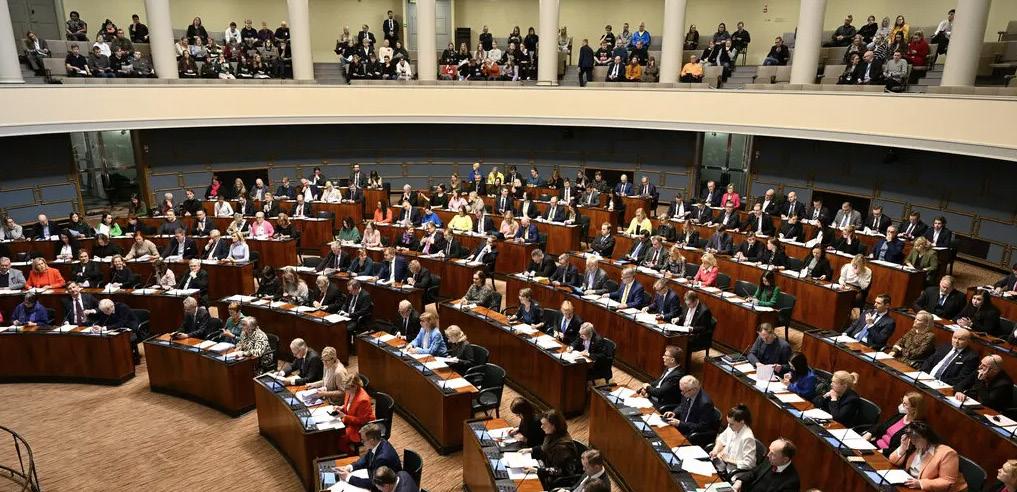
Finland and Sweden had pledged to enter the alliance “hand in hand,” but Sweden’s application has been held up by Turkey. So if Turkey and Hungary soon approve the Finns’ application, as is expected, Finland will join NATO even without its Nordic partner.
In Finland’s 200-member Parliament, 184 voted in favor, 7 voted against, and 1 abstained. Political leaders took up the vote before elections scheduled in April for a new Parliament, in order to avoid any delay.
Finland pushed Sweden to apply to join NATO after Russia invaded Ukraine a year ago. Both countries are members of the European Union, but judged that their traditional policies of military nonalignment were untenable after Russia’s unprovoked attack.
Turkey has indicated that it may split the applications, having little difficulty with Finland but arguing that Sweden needs to do more to satisfy Turkey’s demands for a tougher stance against terrorism and Kurdish separatists. Turkey also wants some Kurds extradited from Sweden to face terrorism-related charges.
In a news conference in Helsinki on Tuesday, Jens Stoltenberg, NATO’s secretary-general, expressed confidence that both Sweden and Finland would soon enter the alliance and that new trilateral talks would take place next week in Brussels.
NATO hopes that Turkey and Hungary will agree before the alliance’s next summit meeting, in mid-July in Vilnius, Lithuania. The parliaments of the other 28 current members have approved both countries’ applications, but all 30 members must agree.
Hungary’s parliament began debating the ratifications Wednesday and could vote this month. Prime Minister Viktor Orban, who controls the government and legislature with a tight fist, has said he supports both applications, but recently raised the possibility that members of parliament from his governing Fidesz party might not.
He said they were worried that the admission of Finland would increase the risk of conflict by creating a new NATO border with Russia stretching more than 800 miles, far longer than Russia’s short borders with alliance members Estonia, Latvia and Poland.
Hungary has a long record of leveraging its veto power within the European Union over sanctions against Russia to try to secure concessions on other issues, primarily those involving money, and it now seems to be doing the same thing over the accession of Finland and Sweden to NATO.
Orban has combined his own tentative support for the admission of Finland and Sweden with angry complaints that the two would-be members — which,
like many others in the European Union, have criticized Hungary’s drift into authoritarianism — have been “spreading blatant lies about us.” Orban asked last week: “How does someone want to be our ally in a military regime if they are unscrupulously spreading lies about Hungary?”
Hungarian politicians complain that Sweden and Finland have been openly critical of Hungary’s abuses of the rule of law. Concerns over the rule of law and corruption have led Brussels to hold up about 6.3 billion euros, about $6.7 billion, in European funds due to Hungary.
Orban has also been eager to keep close ties to Russia, on which Hungary depends for energy, and he has worked to water down some EU sanctions aimed at the Kremlin and its cronies.
Russia, for its part, responded angrily to the applications of Finland and Sweden to join NATO.
But analysts say there is little chance the Hungarian parliament, in which Fidesz has a large majority and almost always votes as Orban instructs, will block the entry to NATO of Finland and Sweden when it votes later this month.
Mate Kocsis, the head of the Fidesz caucus in parliament, said last week that the legislative body would send a delegation to Finland and Sweden to gain “information” so that lawmakers could make an informed decision. He later acknowledged that there is “very little chance” that they would vote to keep Finland and Sweden out of NATO.
If Hungary approves the applications and Turkey approves just Finland for now, Finland will reluctantly join NATO without Sweden. All that is required, once President Sauli Niinisto of Finland signs the legislation as expected, would be to deposit the act in Washington,
the repository for the NATO founding treaty.

“The Hungarian government has made it clear that they will start the discussion within a few days, and I hope that they will ratify soon,” Stoltenberg said, while Turkey “has expressed concerns mainly about Sweden.”
In any case, he said: “Finland and Sweden are in a much better place now than before they applied, because as invitees Finland and Sweden sit at the NATO table, are integrated into the NATO civilian and military structures. They are also provided bilateral security assurances. So it’s inconceivable that there would be any threat against Finland and Sweden without NATO reacting.”
Charly Salonius-Pasternak, an analyst with the Finnish Institute of International Affairs, said after the vote that “Finland has never been in an equally good and safe position militarily.”
Finland’s “defense pillar has been strengthened, bilateral and multilateral cooperation has been strengthened, we have received security promises from NATO member countries,” he told the state broadcaster Yle. “There is a cultural change in our thinking in that we’re no longer alone, which has been a traumatic, mythical way of thinking in Finland.”
President Joe Biden’s most significant failure during his first two years in office is the lack of progress on the truly domestic portion of his domestic agenda.
Earlier in the pandemic, the federal government did more to help parents than it ever did before. Washington temporarily mandated paid leave for many workers, it gave billions of dollars in aid to child care businesses, and for several glorious months in 2021, it even expanded the child tax credit to provide assistance to most families with children.
But the aid has faded away. Biden has persuaded Congress to invest in the nation’s roads and bridges but not in making child care available and affordable. He has presided over a big expansion in federal support for manufacturing — and a sharp drop in federal support for working parents.
At the end of 2022, despite continued economic growth, roughly 3.7 million more American children were living in poverty than at the end of 2021, according to the Center on Poverty and Social Policy at Columbia University.
The primary responsibility for this backsliding rests with congressional Republicans, who have blocked legislation that would guarantee access to affordable child care, ensure workers can take paid sick and family leave and permanently expand the child tax credit.
But Biden can also do better. He needs to campaign for the government to aid Americans as parents with the same passion that he has long devoted to aiding them as workers. He needs to make the case that it is a mistake to see support for corporations as investments while regarding support for people as handouts.
He needs to explain to Americans that everyone benefits when parents are able to work outside the home and children are raised in financially secure families.
Biden’s State of the Union address was substantially devoted to his successes; the work that remains was treated as an afterthought. It ought now to be his focus. Biden needs
to give Americans a clear sense of what is at stake in the next national elections, in 2024.
By then, the White House can make some progress by using its regulatory powers and its bully pulpit. In a promising development, the administration said Tuesday that semiconductor companies applying for new federal subsidies must ensure that child care is available and affordable for the workers who build and operate their factories. This is a principle that ought to be expanded to other corporate recipients of federal handouts — and to the other components of a basic set of benefits that ought to be standard for workers in the United States.
Democrats also need to consider what might be achieved through compromise. They have reason to look back with chagrin on their decision in 2021 to push through a unilateral but temporary expansion of the child tax credit rather than to engage with Senate Republicans who proposed a limited but permanent expansion of the tax credit.


That chance is gone, but some Senate Republicans continue to express interest in expanding the tax credit. Similarly, a pair of purple states have recently begun interesting experiments aimed at encouraging companies to offer paid leave. Last year, Virginia Gov. Glenn Youngkin, a Republican, signed legislation that allows insurance companies to sell paid family leave policies to employers. Companies would pay premiums to the insurer, which covers the wages of employees who take paid leaves.
New Hampshire Gov. Chris Sununu, a Republican, is backing another experiment. The state has created a paidleave insurance fund for its employees. Private employers can join, too — and, to encourage participation, the state is offering a tax credit offsetting 50% of their premiums. Congress could offer a similar credit on federal taxes.
Some critics worry that tax credits will give money to companies that already offer paid leave without inducing a meaningful number of other companies to offer paidleave policies. Some Democrats fret that the Virginia and New Hampshire laws could allow the states to claim to have addressed the need for paid leave without actually doing so. (Some Republicans, meanwhile, think the two states are doing too much. In February, South Dakota’s Legislature rejected a proposal for paid-leave incentives modeled on the New Hampshire program and backed by the state’s Republican governor, Kristi Noem.)
BALANCEO, ALINEAMIENTO, PROGRAMACIÓN DE SENSORES DE GOMAS, MECÁNICA LIVIANA, REPARAMOS AROS

Children hold sign during a press conference on extending child tax credit in front of the Capitol on Wednesday, Dec. 7, 2022.
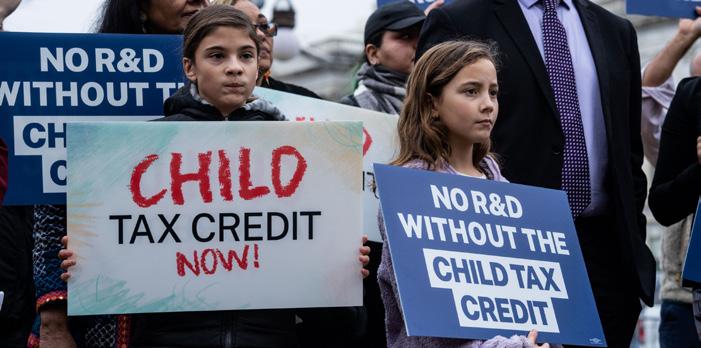
Congress will not. Illinois’ legislature passed a bill in January that puts the state on the verge of becoming the 12th to require paid leave. Such state protections will make a real difference in the lives of millions of workers. And proponents of new policies can make progress in Washington by using states as proving grounds.
But there is a downside if Congress, and red states, persist in doing nothing. Imposing higher standards in blue states is effectively a subsidy for red states, which recruit businesses by minimizing taxation and regulation. Raising national standards is important to protect the stronger state standards. Too much variation in state laws also erodes a national sense of shared circumstances. One underrated role of the federal government is to impose a certain amount of uniformity for the sake of uniformity.
Families need help. Deliver something now, and perhaps more later.
The temptation to resist compromise is reinforced by the progress in blue states, which are rushing to do what
SAN JUAN – La secretaria de Departamento de Transportación y Obras Públicas (DTOP), Eileen Vélez Vega, informó el jueves el cierre de cuatro Estaciones Oficiales de Inspección (EOI) en San Juan y Bayamón, luego de ser detectadas irregularidades en las operaciones del despacho y venta de marbetes.
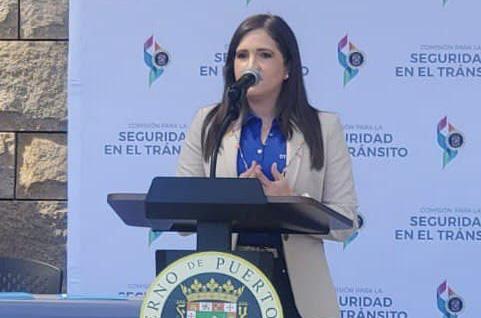
Estas acciones se realizan tras la implementación de un plan agresivo de fiscalización y orientación, en el que se han realizado sobre 50 intervenciones en estaciones oficiales de inspección en los pasados cuatro meses.
“Nuestro equipo de investigadores se encuentra en la calle, fiscalizando de forma agresiva todas las estaciones de inspección. Nuestra meta es orientarlos a todos y detener los actos que se realizan de forma fraudulenta. Agradezco a nuestro equipo, por proteger a los ciudadanos. No nos detendremos hasta lograr erradicar estas prácticas ilegales”, destacó Vélez Vega en declaraciones escritas.
El plan es dirigido por personal de la oficina de investigaciones e Inspección de la Directoría de Servicios al Conductor (DISCO), en colaboración con el Departamento de Hacienda de Puerto Rico y la Oficina del Comisionado de Seguros.
“La División de Investigaciones e Inspección de DISCO, recibió información de un esquema ilegal en el despacho y venta de marbetes y recibió un referido de la ASC iniciando una investigación, que de forma exitosa logró confirmar los procesos ilegales. Exhortamos a los ciudadanos a seguir atentos y a denunciar cualquier irregularidad en los trámites que realizan con sus vehículos”, afirmó la ingeniera Vélez Vega en declaraciones escritas.
Las modalidades de los esquemas detectados se configuran cuando la estación de inspección no registra en el sistema el marbete, los derechos de ACAA, ni la selección del ciudadano del seguro compulsorio apropiándose del pago del contribuyente. Otras de las modalidades se configura al cambiar, sin el consentimiento del ciudadano el proveedor de servicios del seguro compulsorio.
CATAÑO – El alcalde del Municipio de Cataño, Julio Alicea Vasallo, anunció el jueves que a un mes de firmada una Ordenanza Municipal a los fines de prohibir los ruidos innecesarios y sonidos en volumen excesivo que provengan de vehículos de motor, entre otras formas, lo que comúnmente le llaman el “voceteo”, prácticamente no se han reportado querellas por estos actos con la policía municipal.
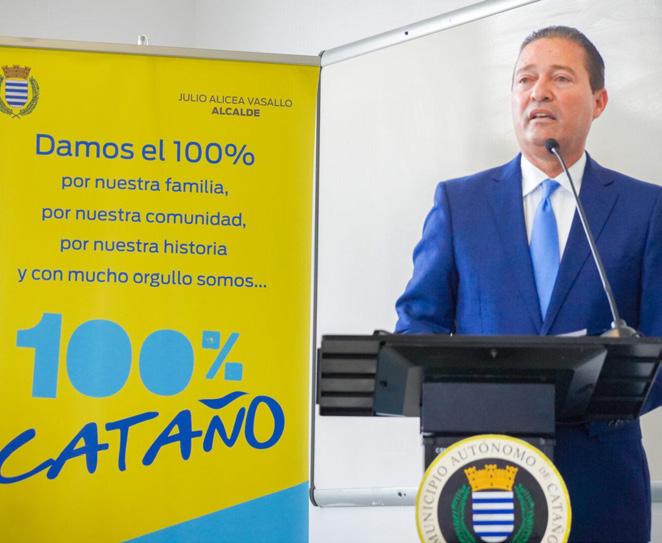
“En el mes de diciembre del año pasado se decretó mediante Orden Ejecutiva la prohibición del uso de pirotecnia aérea y explosiva en las actividades oficiales del Municipio de Cataño, así como en las facilidades bajo su jurisdicción por el bien común de los ciudadanos, en particular de las personas vulnerables y las mascotas. Siguiendo esa meta, el pasado 10 de enero firmé la Ordenanza Municipal Número 6, serie 2022-2023, que prohíbe el “voceteo” en nuestro Municipio. El que viole esta ordenanza se expone a una multa de 500 dólares, pero en este primer mes de implementación, no se han reportado multas, lo que demuestra la cooperación de la ciudadanía”,
destacó el alcalde Alicea Vasallo en declaraciones escritas.
Por ejemplo, los expertos indican que las personas en el espectro del autismo sufren de ansiedad ante los ruidos fuertes, porque su funcionamiento cerebral es distinto. Además, los adultos mayores, los bebés y las personas que padecen stress post- traumático, sufren emocionalmente con el estruendo tanto de pirotecnia como de ruidos excesivos. Por otro lado, con estas medidas también se cuida la calidad de vida de los animales. El efecto auditivo en las mascotas es mayor que en los seres humanos y genera malestar y miedo en los animales.
La Ordenanza, que no tuvo votos en contra de los legisladores municipales, define ruido innecesario como todo sonido fuerte, perturbante, intenso y frecuente que, a la luz de la totalidad de las circunstancias, resulte intolerable, afectando la tranquilidad y el pacifico vivir. De igual forma, el voceteo significará “la práctica no autorizada de uno o más vehículos de motor o de transporte de reunirse en áreas o vías públicas o lugares privados para probar la amplificación o intensidad del sonido que emite el sistema o equipo de sonido
Igualmente, la utilización de artefactos para alterar los resultados de la inspección es una práctica ilegal.
“Reconocemos que la mayoría de las Estaciones Oficiales de Inspección mantienen rigurosos procesos de seguridad para evitar estos tipos de fraude, también conocemos que esta práctica se está realizando y alertamos a la ciudadanía a estar atentos en el proceso de la venta del marbete de su vehículo”, manifestó la secretaria de DTOP.
del vehículo de motor…”.
“Vamos con paso firme mejorando la calidad de vida de nuestros residentes de Cataño y visitantes, en especial en nuestro casco urbano y frente marítimo, para que sean lugares de esparcimiento y sano disfrute de los puertorriqueños y turistas. Exhorto a toda persona que identifique que se esté llevando a cabo el “voceteo” en su comunidad, que llame a nuestra policía municipal al 787-788-8877 para su pertinente intervención”, finalizó señalando el primer ejecutivo municipal, Julio Alicea Vasallo.
Municipio de Cataño prohíbe el “voceteo”
DTOP informa cierre de cuatro Estaciones Oficiales de Inspección esta semana tras detectar
In 2020, director Darren Aronofsky stumbled upon an old movie trailer featuring Fraser and thought the actor was ripe for reclamation: He offered Fraser the lead role in “The Whale,” based on the play by Samuel D. Hunter, about Charlie, an obese professor who has withdrawn from the world but is trying to make things right with his estranged daughter (Sadie Sink). To play Charlie, Fraser consulted with the Obesity Action Coalition and donned a prosthetic suit so heavy that it had to be filled with tubes of cold water to regulate his body temperature.
“It was a fusion of man and machine, in a way,” he said.
Fraser’s performance in “The Whale” has earned him an Oscar nomination and a Screen Actors Guild Award for best actor, and later this year, he’ll be seen in Martin Scorsese’s “Killers of the Flower Moon,” proving that his prestige comeback is no one-off.
“If directors are painters and actors are the different colors, there hasn’t been a color like Brendan on the palette for a very long time,” Aronofsky said. “I’m really, really proud that he’s getting what he deserved.”
In person, Fraser is so courtly and soft-spoken that simply munching on a salad opposite him can make you feel as if you’re crashing cymbals together. When I met him at a West Hollywood hotel restaurant in mid-February, he spoke with humility about the awards-season arc that has made him a Hollywood star again.

standards lower and let things slide that otherwise would be really concerning to you.
Q: “The Whale” required you to wear extensive prosthetics. How does that affect the way you give a performance?
A: I knew it’s essentially mask work. I knew that it would be uncomfortable. So what? I knew that I would need to be really patient to stay hooked into the scenes that we were playing while they made adjustments between takes. And Darren likes to shoot a lot of takes. So I had to be like a horse I used to have that was just so sanguine. You could tack him up, brush him, smack the flies on him, and he would never jump. You’ve got to stand still and just take it, be patient and don’t bite or kick anyone because they’re there to help you. Then you let that all go and do what you need to.
Q: How did you prepare for the film?
A: The Obesity Action Coalition gave me access to many people, so I could ask them their story on Zoom calls. I talked to maybe eight or 10 people — some bedridden, some perfectly mobile — and asked them, “Walk me through your diet for a day.” And they would describe it to me in [the] way a person drinks, a person uses substances, sex, gambling addiction.
By KYLE BUCHANANOnce upon a time, when a gigantic Marlboro Man was perched in front of the Chateau Marmont and a three-course meal for two still cost well under $100 at Spago, Brendan Fraser arrived in Hollywood ready to conquer it and found, with some surprise, that the place didn’t put up a fight. Movie stardom came a little too easily to the young, strapping Canadian, and he knows that now, because he’s since been through passages of life that proved much harder.
“I’ve been driving around, looking at this town I used to live in,” Fraser, now 54, told me recently in Los Angeles, “and it’s like seeing ghosts of myself, the recollections that come back.”
He remembers the excitement of the 1990s, when he hit it big with lead roles in films like “Encino Man” and “School Ties,” swung through the trees as the amiably hunky “George of the Jungle” and engaged in dashing feats of derring-do in “The Mummy.” But he was perceived less as a serious actor and more as a handsome goof. And as Fraser’s big-screen comedies began to pay fewer dividends in the 2000s, he contended with a series of offscreen difficulties, including a costly divorce, injuries incurred from years of grueling stunt work, and a sexual assault that he said was committed by former Golden Globes boss Philip Berk and that caused him to withdraw from the spotlight. (Berk has denied the accusation.)
“I’ll take nothing for granted, knowing how far-reaching this journey has been,” he said.
Here are edited excerpts from our conversation.
Q: As this awards season goes on, have you gotten to know your fellow nominees?
A: Yeah, and to have a profound respect for one another, too, knowing that we’re all sort of on the same gantlet course or boot camp: Jump, crawl, swim, sharks, barbed wire, do it again! I feel a camaraderie, and I was delighted to see Ke [Huy Quan] again because the last time I saw him was many years ago and we worked together on “Encino Man.” I was effusive and I said, “We’re still here.” He said, “That’s right, we are.” I’m so pleased to see his resurgence.
)Q: How does it feel to be making these acceptance speeches and bear witness to so many tributes?
A: I’m having a repetition of out-of-body experiences, pinching myself: Is this really happening to me? My obligation is to take ownership of this wave of generosity and support. It’s really boggling my mind and I’m so grateful for it, but I’d be remiss to not acknowledge it properly.
Q: In what way do you need to take ownership of all these events?
A: I just need to be worthy of them because I’m aware of where I was, where I went and where I am now. At the same time, I’m reticent to become overconfident about anything because I’ve been on the merry-go-round a number of times, and I know that if you’re too comfortable, you can become complacent. That’s when you get into trouble and let your
Self-medicating by eating is all in the same wheelhouse of that behavior, a cycle of risk, reward, risk, reward, pleasure me, pleasure me. We humans, shaved apes, can’t not press the button. That happens in the same way neurologically as it does for people who have those other vices as a crutch in their life, so if they deserve your sympathy, so does a person who has the temerity to just exist in a body that’s enormous. I say that cynically.
Q: What of yourself did you bring to Charlie?
A: I know what it feels like to be the brunt of a joke that’s mean. You’re looking at a guy who has been compared against an example of myself from 25 years ago in a loincloth. That’s salacious and sells copies of the Daily Mail, but to hell with the consequences of who might be the human being on the receiving end of that kind of scorn and derision. Guess what? It’s not nice.
I have feelings. I can identify with the constant harangue that people who live in oversized bodies have to endure in their daily life. They become overlooked by doctors, they don’t get the same attention. That really does play at your confidence, and it can lead to more harmful behavior. It’s a health consequence that is essentially eradicated if we just stop being mean to one another.
Q: How did you feel on the final day of filming?
A: The last time I took this makeup off, I became really emotional. I know it’s a little woo-woo actor-y, but it wasn’t lost on me that I could remove the costuming, and the people who live in that body can’t. I felt hopeful that I hadn’t cheated them by pretending to be who they were in a way that wasn’t helpful, but I really did feel like I was saying goodbye to a guy I knew in a very personal way.
Brendan Fraser in Beverly Hills, Calif., Feb. 13, 2023. “I’m aware of whereIwas, where
Iwent and where I am now,” said the actor, who is nominated for an Oscar for his remarkable comeback in “The Whale.”
Also, after having played this part, I felt like it gave me a salvation. It let me present myself again to an industry that, if you’re out of sight, you’re out of mind. We all grow older, we all change — less hair, different body. I wanted to play Charlie so that I could lean into all of that and embrace it, to suck the oxygen out of the bullying voices that maybe I imagined would disapprove. I’ll be honest with you, I do feel a sense of redeeming myself for being able to deliver a performance that both reinvents who I am and pays tribute to everything that was overlooked about how I
formerly existed professionally.
Q: What did acting mean to you in your early 20s? Does it mean something different to you now?
A: Back then, it was life and death. Those are the stakes of a young person’s ambition. But at the moment, I feel like I got nothing to prove. For everything that I did to create this character, I’m all out of moves. If it didn’t land, then I seriously don’t know what I’m doing. That’s how I felt at the end of it.
Q: So how does it feel to know that it landed?
A: Gratifying, and it feels like it’s doing some good. After Toronto [the September film festival], one of the guys from the OAC wrote to me and said the film moved him and he firmly believes that this character will save someone’s life, if not many. I know the response has been varied — pro, con, all of that, and I embrace the controversy — but in the press, a man who hadn’t even seen the film yet said, “That’s my story.” [Like Charlie], he does hide from his co-workers and students with the computer. He does have a strained relationship with his child. He can’t leave his
house for fear of ridicule, and he can’t breathe properly for the weight that his body carries.
To have that acknowledgment and to have this guy say something to the effect of “I am inspired now to change my ways,” I mean, what do you say to that other than mission accomplished? We make movies to entertain and to enlighten, but every now and then, maybe one of them comes along and can actually do something to change the culture or to change the way we think, if only for a little while. And I’m lucky to be in this one.

Cielo and Gustavo have been warned to stay away from the police, but it’s not clear the authorities would be of much help. As the days pass, Cielo finds herself increasingly isolated and in peril. After she starts investigating the crime on her own — following suspicious cars, asking questions of a shopkeeper and a funeral home director — someone shoots up her house and sets fire to her car.
Why is this happening? To the characters in “La Civil,” the answers are both obvious and beyond all reckoning. People talk about the drug cartels and the lethal rivalries between them, but Cielo’s plight isn’t immediately connected to the business of narcotics trafficking. Kidnapping is an enterprise in its own right, and the nightmare zone of torture, rape and murder that Cielo uncovers seems to run on pure sadism rather than greed or ambition.
By A.O. SCOTTThe opening scenes of “La Civil,” Teodora Ana Mihai’s first nondocumentary feature, present a slice of ordinary life in northern Mexico — the morning routine of a teenage girl and her mother. This will be the last normal morning that Laura (Denisse Azpilcueta) and Cielo (Arcelia Ramírez) spend together. Their family is about to be torn apart by a crime that is itself dismayingly routine. By the end of the day, Laura has been kidnapped, and Cielo is plunged into an anguished, endless ordeal as she tries to get her daughter back. Movies about parents reacting to the abduction of a child — seeking vengeance, justice, rescue — are anything but rare. And while “La Civil” would never be mistaken for a Liam Neeson angry-dad thriller, it does draw
on some of the tropes and conventions of the genre. Cielo, played by Ramírez with devastating composure, proceeds from panic to terror to monomaniacal determination. After her first frightening meeting with the two young men who claim to represent the kidnappers, she never stops moving. We follow her as she descends into a world of violence and cruelty that exists in the midst of her everyday reality.
Cielo’s estranged husband, Gustavo (Álvaro Guerrero), isn’t much help. He’s slow to accept the news of the kidnapping, reluctant to give up the pickup truck that has been demanded as part of the ransom, and generally vain and inept when it comes to the necessary planning and negotiation. Partial payment doesn’t return Laura to her parents, and neither does the intercession of a supposedly powerful friend of Gustavo’s.
To enter that universe is either to become a victim or to succumb to its grim, amoral code. Or both. For a time, Cielo finds an apparent ally in Lt. Lamarque (Jorge A. Jiménez), a swaggering officer in the national police force. Their association may bring her closer to finding out what happened to Laura — although no closer to Laura herself — but it also makes her complicit in atrocities committed in the name of the law. But the point of “La Civil” — the bitter irony of its title — is that law, morality and basic human decency have no place in the world Cielo must now inhabit.
The film, shot in shallow-focus digital (the cinematographer is Marius Panduru), with many close-ups of Ramírez’s tragic face, is a relentless study in failure, frustration and grief. Its rigor is impressive, but also something of a narrative trap. Once the futility of Cielo’s situation, and her persistence in the face of it, are definitively established, a feeling of paralysis sets in. The demoralization that afflicts Cielo casts a shadow on the audience, whose capacity for compassion may reach its limit even before the full measure of her suffering has been taken.
‘La Civil’
Not rated. In Spanish, with subtitles.


Puerto Rico Secretary of State Omar J. Marrero Díaz
invited a group of guests to a “Dominican Cultural Night with Flavor” together with the consul general of the Dominican Republic Consulate in Puerto Rico, César Cedeño Ávila, in celebration of the 179th anniversary of the independence of the Dominican Republic.

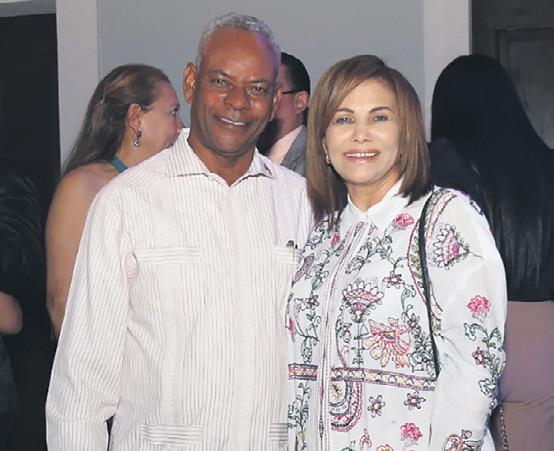


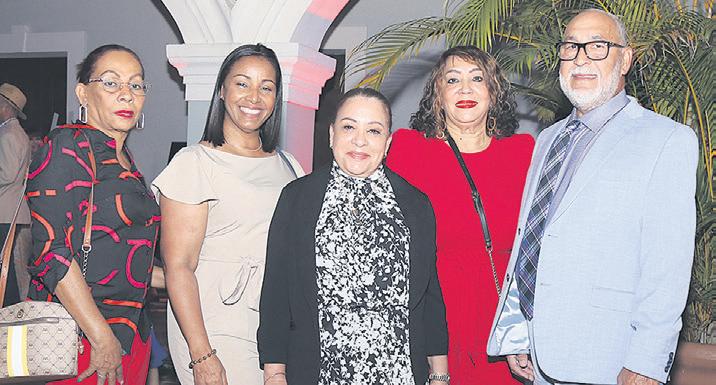

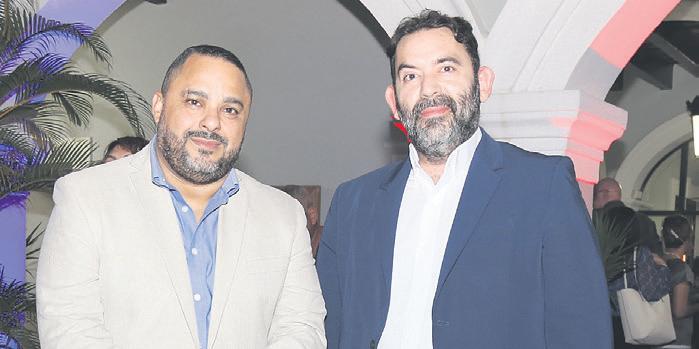
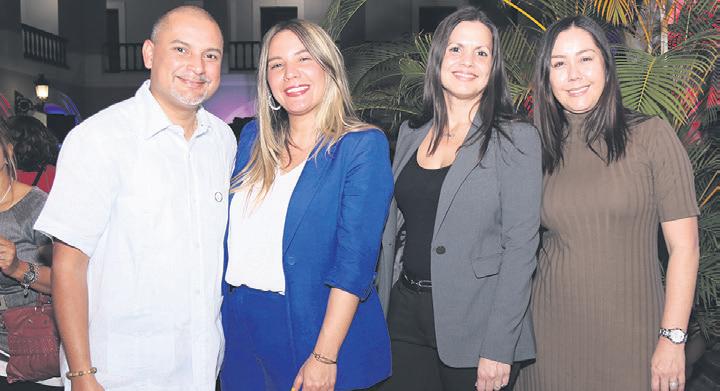

The guests enjoyed gastronomic delights, traditional music and dancers on the State Department’s outdoor patio, which was decorated with colorful themed decorations, flags and flowers. Moreover, speeches marking the occasion were given by Governor Pedro Pierluisi Urrutia, the secretary of state and the consul general of the Dominican Republic as they danced on stage to the lively music, paying homage to a lovely cultural experience.
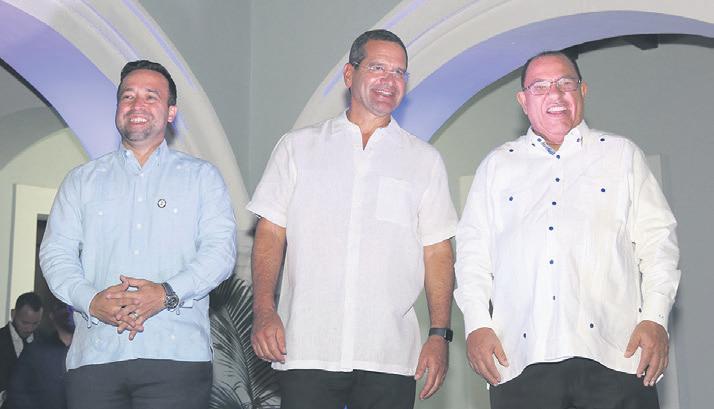
After hours of deliberation over safety concerns, a Food and Drug Administration advisory panel on Wednesday recommended approval of a second vaccine for the respiratory syncytial virus in older adults, advancing the first shots against an illness that can be deadly for the very young and the very old.
Over two days this week, the panel debated and then voted in favor of two vaccines, one by Pfizer and one by GSK (GlaxoSmithKline), that would become available for adults 60 and older.
The panels made their recommendations to the agency, which typically abides by advisory committee decisions and could grant formal approval within months.
The FDA estimates that RSV is associated with 6,000 to 10,000 deaths each year in adults 65 and older and at least 60,000 hospitalizations in that group. It is a leading killer of children worldwide. This winter, RSV contributed to the tripledemic also involving flu and COVID cases that swamped children’s hospitals and some intensive care units. The caseloads have eased off recently.
In addition to the vaccine candidates reviewed by the panel this week, AstraZeneca and Sanofi are seeking FDA approval of a monoclonal antibody treatment aimed at protecting infants and toddlers up to 2 years old from RSV infections. The companies reported findings from a major study indicating that the therapy reduced “medically attended” illnesses by 75% after one infusion, according to AstraZeneca.
Pfizer is seeking separate approval for an RSV vaccine given in the later stages of pregnancy to protect the youngest. It was 82% effective in keeping infants from developing severe RSV in the first 90 days after they were born, the company said, though the effectiveness fell to 69% by the time the infants were six months old.
During two days of meetings this week, the FDA advisers examining data on the proposed vaccines for older adults were not viewing the process as a simple pathway to approval. They debated the benefits of a vaccine for RSV patients who overwhelmingly avoided hospitalization against the very few, but concerning, reports of autoimmune conditions like
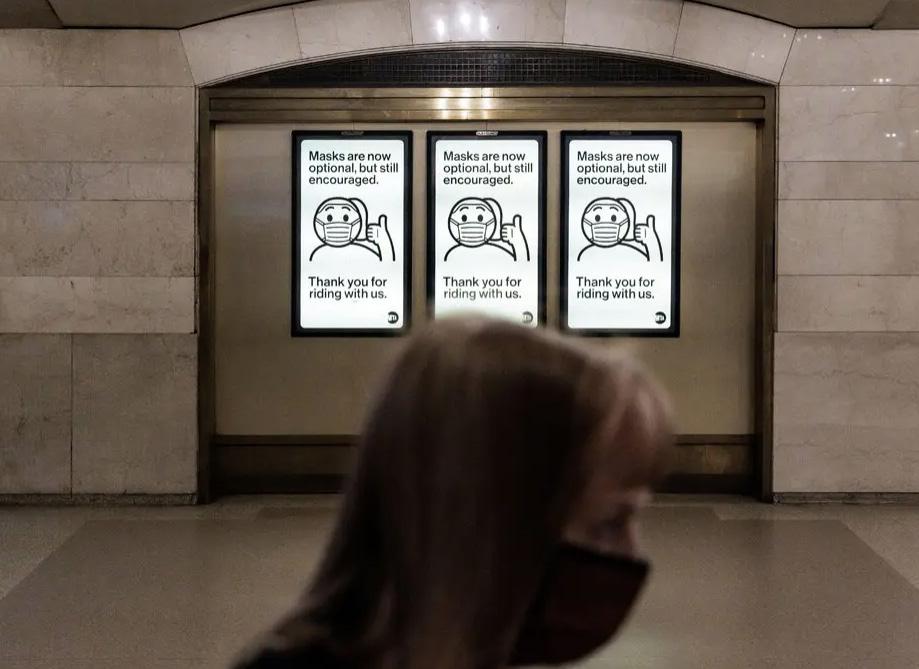
Guillain-Barré syndrome that emerged shortly after the shots were administered.
On Tuesday, the panel voted in favor of the Pfizer vaccine by 7-4, with one abstention, on its safety and efficacy. On Wednesday, it voted 10-2 in favor of the GSK vaccine’s safety and unanimously on the shot’s efficacy.
About 34,000 patients were studied in Pfizer’s trial, with half getting a placebo, according to an FDA summary of the data. The vaccine was deemed nearly 67% effective in preventing RSV-related lower respiratory tract illness, which can lead to pneumonia. That vaccine was nearly 86% effective in treating the disease with three or more symptoms, according to the data.
The GSK vaccine was nearly 83% effective in lower respiratory tract illness in a study of about 25,000 patients — half on the vaccine and half on a placebo, according to data the company provided to the FDA. No RSV deaths were reported among the patients in the GSK or Pfizer studies.
Several panel members expressed concerns about side effects reported with each vaccine. After seven days, one patient who received the Pfizer vaccine developed Guillain-Barré syndrome, a condition in which the immune system
attacks the nervous system (but not the spine or brain). The case was considered life-threatening, FDA records show, although a “potentially confounding factor” was that the patient had a heart attack the day before the condition developed.
Another Pfizer vaccine recipient developed Miller Fisher syndrome, which is considered to be a type of Guillain-Barré, eight days after getting the shot. That patient, from Japan, reported double vision and a tingling or burning feeling in her palms and the soles of her feet. Her symptoms were mostly resolved within 41 days, the FDA records said.
The two cases in the Pfizer study put the rate of the condition at about 1 in 9,000, even though it is typically about 1 in 100,000, according to Dr. Hana El Sahly, chair of the vaccine advisory committee and a professor of virology at Baylor College of Medicine. “So this is major,” El Sahly said.
Dr. Marie Griffin, a health policy professor at Vanderbilt University, said the Pfizer vaccine was hard to evaluate given the low incidence of severe infections among those in the trial.
“I think the benefit for relatively healthy, older people — you have to consider that — is not that great,” Griffin said. “Compared to a possible high risk of
a very severe outcome.”
One recipient of the GSK vaccine, a 78-year-old from Japan, developed Guillain-Barré nine days after being vaccinated; she then spent six months in a rehabilitation hospital. The company and the FDA considered the case to be related to the vaccine.
Two recipients of the GSK vaccine, both 71 and from South Africa, developed acute disseminated encephalomyelitis, a neurological disorder with symptoms including weakness and loss of vision. One case resulted in death. The company and the FDA considered the cases “possibly related” to the vaccine, noting that both patients also received a flu vaccine at the same time as the RSV shot.
Watching the safety of the vaccines after they are approved will be important, said Dr. Henry Bernstein of the Zucker School of Medicine at Hofstra University, and should be considered against the background that the effort to create an RSV vaccine has gone on for years.
“I don’t know that there’s a rush to get this to market if we’re going to take two steps forward and three steps back as far as public health and optimizing vaccination rates,” Bernstein said.
Pfizer and GSK said they would conduct continuing safety monitoring of the vaccines if they were approved by the FDA.
Moderna is developing an mRNAbased vaccine for RSV in older people and said it plans to submit favorable data from a major trial to the FDA for approval in the first half of this year. Janssen and Bavarian Nordic have announced studies are underway for their RSV vaccines.
Vaccine experts from the Centers for Disease Control and Prevention examined the Pfizer and GSK study data and determined that in one year, more than 21,000 people age 65 and older would need to take the GSK vaccine to prevent one RSV death; the number was nearly 25,000 for the Pfizer shot. They concluded that the data supported use of the vaccines for patients in that age group (but not in patients age 60 and older).
A CDC survey of nearly 600 people age 60 and older reported that 68% would “definitely” or “probably” get an RSV vaccine if an option approved by the FDA were available. Nearly 10% more said they would get the shot if a health care provider recommended it.
If you’re planning to dine out in Buenos Aires, Argentina, be prepared for an unfamiliar sight: lines. As the city springs back to life, the streets feel almost celebratory, an antidote to the lingering side effects of extended COVID lockdowns. Alfresco tables are packed. Locals who would never have queued up for dinner before the pandemic are now willing to wait for a taste of what a new generation of chefs is cooking up.
Julio Baez: Showing off the bounty of the land
“There’s a mentality of ‘I don’t know what’s going to happen tomorrow, so I am going to enjoy life now,’ ” said Julio Baez, 37, who opened his 22-seat restaurant Julia in the up-and-coming Villa Crespo neighborhood in 2019. Because of inflation, it’s too expensive for most Argentines to travel abroad right now, he explained, so they’re spending their money on a good meal and a fun night out.
Like many young chefs in the city, Baez is championing Argentine ingredients for their quality and sustainability. “The land is so fertile in Argentina,” Baez said. “We want to show that off.”
At Julia and his newest restaurant, Franca, also in Villa Crespo, Baez sources fruits and vegetables from small producers across Argentina that he fuses with global flavors to create a parade of original dishes. Julia’s seasonal à la carte dishes and 10-course tasting menu (30,000 pesos, or about $150 — prices are as of mid-February but are subject to change because of inflation) both include fresh squid from Patagonia tossed in a yogurt-walnut pesto and crowned with sliced avocado (3,500 pesos); semi-dehydrated watermelon tartare (3,500 pesos); and Wagyu beef aged with koji (cooked fermented rice), Provençal potatoes and a shio koji emulsion (12,500 pesos).
In nearby Chacarita, Lis Ra, 33, re-imagines flavors from her youth at Na Num, a 34-seat Korean-fusion restaurant she opened in July 2020 in a former pharmacy space. “When I was growing up, my parents always mixed Korean and Argentine food, so this combination of flavors comes naturally to me,” she said.
To make her own fermented pastes and sauces, she uses ingredients like spicy chile flakes, ginger, garlic and soy sauce to season fresh Argentine produce, seafood, meats and cheeses. “I love piling flavors and textures on top of each other,” Ra said.
A big seller for vegans is a dish that riffs on humitas — a traditional northern Argentine corn pudding — that’s served as a creamy brûlée made with almond milk and topped with sautéed kimchi and daikon pickles (2,100 pesos). One of her personal favorites is the mussels ceviche prepared with a kimchi-based broth, crispy buckwheat granola, pomegranate seeds, toasted seaweed, sesame oil and cilantro (3,100 pesos). “It has a lot of layers,” Ra said.
Mariano Ramón: Fine dining priced for the masses
At Gran Dabbang, a casual space in Palermo, Mariano Ramón, 41, has made it his mission to democratize fine
dining. “The concept behind the restaurant is to showcase the diversity of superior products that exist in Argentina and make them accessible to everyone in a relaxed, inclusive environment,” Ramón said. “We kept the design simple in order to invest our resources in the best ingredients and human capital and still keep dishes around $5 to $10.”
Nuanced fare nods to Asia and the Middle East while using domestic ingredients. Crowd favorites on the menu include a starter of labneh layered with Japanese cucumber, dehydrated cherries, tamarind chutney, Andean black mint, slivered pecans, sliced fennel, peppery chiles and pomegranate seeds served alongside a plate of fried chickpea noodles for mixing (1,800 pesos).
Look for entrees like grilled quail marinated with rica rica (a floral, bitter, high-altitude herb), ginger-garlic paste and yogurt (4,500 pesos), and whole roasted pacu (a freshwater fish from the more tropical northeastern region of Argentina) brightened with fresh turmeric, lemon, almondand-yogurt paste, cardamom and Jamaican pepper and topped with papaya raita and coriander chutney (6,500 pesos).
“Many tropical ingredients locals think are ‘exotic’ are actually native to northern Argentina,” Ramón said.
Facundo Kelemen: Surprising twists on classic recipes
For Mengano, his 2018 debut in Palermo, Facundo Kelemen, 35, re-imagined a bodegón — a classic neighborhood restaurant — in an early-20th-century home, decorating it with family portraits and heirloom furniture. An open kitchen allows diners to watch the chef prepare reinterpre-
tations of time-honored recipes that are served as small plates meant for sharing. “Each dish carries a certain level of surprise, and they are all emblematic of Argentine cuisine, which is mainly an amalgam of Spanish, Italian and Creole influences,” he said. The fried beef empanadas are stuffed with onion, bell pepper, garlic, spices and a savory meat broth that bursts out with every bite (1,020 pesos). Other standouts include Patagonian lamb tartare (2,310 pesos), gnocchi made with cassava starch (3,170 pesos), and a crispy rice dish that falls somewhere between a risotto and socarrat — the layer of toasted rice at the bottom of a paella (3,110 pesos).
Olivia Saal: Baked creations and a kitchen at center stage
At Oli, a bright and lively cafe open for breakfast, brunch and lunch near the bustling Colegiales neighborhood, Olivia Saal, 28, has split the menu evenly between freshly baked confections and savory offerings. Top picks include made-from-scratch French toast stacked with thin layers of yogurt, mascarpone cream and fruits like mixed berries and figs (1,540 pesos), as well as her knockout sugar-glazed medialunas (Argentine pastries similar to a croissants). For a salty snack, order a grill-pressed ham and cheese on chipá, a cheese bread made with cassava (990 pesos). The dining room overlooks a glass-enclosed kitchen where a bevy of tattooed young people are hard at work. “I always dreamed of having a restaurant where diners could see who was feeding them,” Saal said, “and where the culinary team could watch guests walk in and leave happy.”
 An undated photo by Nora Walsh inside Oli, a breakfast and lunch spot in a bright, glassy space in the Colegiales neighborhood. Local Argentine ingredients are the stars on the menus in Buenos Aires, a city that feels almost jubilant after long COVID-19 lockdowns.
An undated photo by Nora Walsh inside Oli, a breakfast and lunch spot in a bright, glassy space in the Colegiales neighborhood. Local Argentine ingredients are the stars on the menus in Buenos Aires, a city that feels almost jubilant after long COVID-19 lockdowns.
IN THE UNITED STATES DISTRICT COURT FOR THE DISTRICT OF PUERTO RICO
WILMINGTON SAVINGS
FUND SOCIETY, FSB, D/B/A CHRISTIANA TRUST, AS INDENTURE TRUSTEE, FOR THE CSMC 2015-PR1 TRUST, MORTGAGE-BACKED NOTES, SERIES 2015-PR1
Plaintiff V.
GLADYVIRG RIVERA
JIMENEZ, ALSO KNOWN AS GLADYVING RIVERA JIMENEZ
Defendant(s)
Civil No.: 3:18-CV-01978.
(FAB). FORECLOSURE OF MORTGAGE AND COLLECTION OF MONIES. NOTICE OF SALE.
To: GLADYVIRG RIVERA
JIMENEZ, ALSO KNOWN AS GLADYVING RIVERA
JIMENEZ. APT. 1303-B, COND. PARQUE DE SAN FRANCISCO, BAYAMÓN, PR 00959; APT. 1303 B BOX 126, BAYAMÓN, PUERTO RICO 00959; THE GENERAL PUBLIC.
WHEREAS: On March 23, 2022, this Court entered Default Judgment in favor of Plaintiff, against Defendant. On August 10, 2022, this Court entered Order for Execution of Judgment, stating that Defendant has failed to pay the sums of monies adjudged to be paid under the judgment. The In the Judgment, this Court stated that Defendant has defaulted on the repayment obligation to WILMINGTON SAVINGS FUND SOCIETY, FSB, D/B/A CHRISTIANA TRUST, AS INDENTURE TRUSTEE, FOR THE CSMC 2015-PR1 TRUST, MORTGAGE-BACKED NOTES, SERIES 2015PR1, and ordered to pay the Plaintiff the principal sum of ONE HUNDRED TWO THOUSAND THREE HUNDRED THIRTY-FOUR DOLLARS AND THIRTY-TWO CENTS ($102,334.32), plus interest at 7.000% per annum from January 1, 2016, which will continue to accrue interest at the contractual rate. The defendant also owes and the Court ordered to pay Wilmington Savings all advances made in accordance with the mortgage note, including, but not limited to, insurance premiums, taxes and inspections, as well as 10% of the original principal balance, or $9,500.00, to cover costs, expenses, and attorney’s fees guaranteed by the mortgage obligation. The records of the case and of these proceedings
may be examined by the parties at the office of the Clerk of the United States District Court, Federal Building, Chardón Avenue, Hato Rey, Puerto Rico. WHERAEAS, Pursuant to the terms of the aforementioned judgment and the order of execution thereof, the following property belonging to Defendant will be sold at a public auction: HORIZONTAL PRO-
PERTY: San Francisco Condominium, Apartment B-1303: Rectangular shape, three bedroom unit with a total construction area of 865.46 square feet, equivalent to 80.40 square meters, distributed in 798.06 square feet, equivalent to 74.14 square meters of enclosed area and 67.40 square feet, equivalent to 6.26 square meters of porch. The main entrance is located on the South side. This apartment is located in Building B of the Condominium and occupies part of the thirteenth floor of the building. The maximum length of this unit is 25’5” and the maximum width is 44’ 4”. Its boundaries all: by the NORTH, in a distance of 44’4”, equivalent to 13.52 meters, with the common wall that separates it from apartment number 1304 and the common interior areas; by the SOUTH, in a distance of 44’ 4”, equivalent to 13.52 meters with exterior common areas; by the EAST, in a distance of 24’ 1”, equivalent to 7.34 meter with the common wall that separates it from apartment number 1302 and interior and exterior common areas and by the WEST, in a distance of 25’ 3”, equivalent to 7.70 meters with the exterior common areas. This unit contains a kitchen, a living room, a dining room, three bedrooms with closet, two bathrooms and a covered porch. Se le asigna a este apartamento el estacionamiento número 85 como elemento común limitado. Este apartamento tiene una participación de .61792% en los elementos comunes del condominio. Property recorded at page 61, volume 1708 of Bayamón Sur, property number 71489, Registry of the Property of Puerto Rico, Section I of Bayamón. WHEREAS: The property is subject to the following lien: HIPOTECA en garantía de pagaré a favor de RG Premier Bank de Puerto Rico, o a su orden, por la suma de $95,000.00 con intereses al 7.00% anual y vencimiento 1ro de agosto de 2036. Constituida por la Escritura 571 otorgada en San Juan el 31 de julio de 2006 ante el notario Antonio José Cruz Bonilla, e inscrita y extendido su asiento abreviado el 4 de mayo de 2011 bajo la Ley 216 del 27 de diciembre de 2010 para Agilizar el Registro de La Propiedad, al folio 161
del tomo 1846 de Bayamón Sur, finca 71489, inscripción 5ª. AMPLIADA en una suma adicional de $12,209.77 y MODIFICADA en cuanto a su interés y vencimiento, siendo ahora su principal por $107,209.77 con intereses al 7.00% anual y vencimiento 1ro de enero de 2042, según consta de la escritura 12 otorgada en San Juan el 20 de enero de 2012 ante la notario Ileana Quintero Aguiló, e inscrita al folio 161 del tomo 1846 de Bayamón Sur, finca 71489, inscripción 6ª. Senior Lien: None. The above-described property is subject to the following junior lien: HIPOTECA en garantía de pagaré a favor de la Corporación para el Financiamiento de la Vivienda de Puerto Rico, o a su orden, por la suma de $24,700.00 sin intereses y vencimiento 20 años. Constituida por la Escritura 48 otorgada en San Juan el 23 de enero de 2001 ante el notario Miguel A. García Rivera, e inscrita al folio 62 del tomo 1708 de Bayamón Sur, finca 71489, inscripción 2ª. Potential bidders are advised to verify the extent of preferential lien with the holders thereof. It shall be understood that each bidder accepts as sufficient the title and that prior and preferential lien to the one being foreclosed upon, including but not limited to any property tax, lien (express, tacit, implied or legal), shall continue in effect it being understood further that the successful bidder accepts them and is subrogated in the responsibility for the same and that the bid price shall not be applied toward their cancellation. The present property will be acquired free and clear of all junior liens. WHEREAS: For the purpose of the First Judicial Sale, the minimum bid agreed upon by the parties in the mortgage deed will be $107,209.77 for the property and no lower offers will be accepted. Should the first judicial sale of the abovedescribed property be unsuccessful, then the minimum bid for the property on the Second Judicial Sale will be two-thirds of the amount of the minimum bid for the First Judicial Sale, or $71,473.18. The minimum bid for the Third Judicial Sale, if the same is necessary, will be onehalf of the minimum bid agreed upon by the parties in the aforementioned mortgage deed, or $53,604.89 (Known in the Spanish language as: “Ley del Registro de la Propiedad Inmobiliaria del Estado Libre Asociado de Puerto Rico, 2015 Puerto Rico Laws Act 210 (H.B. 2479), Article 104, as amended. WHE-
REAS: Said sale to be made by the appointed Special Master is subject to confirmation by the United States District Court for the District of Puerto Rico and

the deed of conveyance and possession to the property will be executed and delivered only after such confirmation. NOW THREFORE, public notice is hereby given that the appointed Special Master, pursuant to the provisions of the Judgment herein before referred to, will on MARCH 3, 2023 AT 10:30 AM, in the Office of the Clerk of the United States District Court, Room 150, Federal Building, Chardón Avenue, Hato Rey, Puerto Rico in accordance with 28 U.S.C. § 2001 will sell at public auction to the highest bidder, the property described herein, the proceeds of said sale to be applied in the manner and form provided by the Court’s judgment. Should the first judicial sale set hereinabove be unsuccessful, the SECOND JUDICIAL SALE of the property describes in the Notice will be held on MARCH 10, 2023 AT 10:30AM, at the Office of the Clerk of the United States District Court located at the address indicated above. Should the second judicial sale set hereinabove be unsuccessful, the THIRD JUDICIAL SALE of the property described in this Notice will be held on MARCH 17, 2023 AT 10:30AM, at the Office of the Clerk of the United States District Court, located at the address indicated above. In San Juan, Puerto Rico, this 25th day of January 2023. JOEL RONDA FELICIANO, APPOINTED SPECIAL MASTER.
LEGAL NOTICE
IN THE UNITED STATES DISTRICT COURT FOR THE DISTRICT OF PUERTO RICO
MTGLQ INVESTORS LP
Plaintiff V. EDRIC ENRIQUE VIVONI RIVERA; ET AL
Defendants
Civil Action Num.: 19-CV01599. (JAG). Matter: COLLECTION OF MONIES AND FORECLOSURE. NOTICE OF SALE.
To: EDRIC ENRIQUE
VIVONI RIVERA and the GENERAL PUBLIC:
WHEREAS: On March 2, 2022 Default Judgment was entered and grated on same day in favor of Plaintiff to recover from defendants the principal amount of $77,007.64 plus interest at a rate of 3.375% per annum since January 1st, 2018, which continue to accrue until the debt is paid in full; a deferred principal balance of $55,200.67, which does not accrue interest; late charges on the amount of 5.00% of each and any monthly installment not received by the note holder within 15 days after the installment was due, all advances made under the mortga-
ge note including but not limited to insurance premiums, taxes and inspections as well as 10% of the original principal amount $26,200.00 to cover, costs, expenses, and attorney’s fees guaranteed under the mortgage obligations. The records of the case and of these proceedings may be examined by interested parties at the Office of the Clerk of the United States District Court, Room 150 Federal Office Building, 150 Chardon Avenue, Hato Rey, Puerto Rico.
WHEREAS: Pursuant to the terms of the aforementioned Judgment, Order of Execution, and the Writ of Execution thereof, the undersigned Special Master was ordered to sell at public auction for U.S. currency in cash or certified check without appraisement or right of redemption to the highest bidder and at the office of the Clerk of the Court, Room 150 – Federal Office Building, 150 Carlos Chardón Avenue, Hato Rey, Puerto Rico, to cover the sums adjudged to be paid to the plaintiff, the following property described in Spanish: RUSTICA: Parcela de terreno en el Barrio Caimito Alto del término municipal de San Juan, Puerto Rico, con un área superficial de cinco mil ciento cuarenta y dos metros cuadrados con tres mil trescientos setenta y una diez milésimas de otro (5,142.3371 m.c.), equivalentes a una cuerda con tres mil ochenta y cuatro diez milésimas de cuerda (1.2084 cdas) (así surge) identificada en el Plano de Inscripción con el número dos (2). En lindes por el NORTE, en tres alineaciones que suman ochenta y cuatro metros lineales con mil quinientos siete diez milésimas de otro (84.1507 ml) con la faja de uso público del Plano de Inscripción; por el SUR, en seis (6) alineaciones que suman treinta y cinco metros lineales con cuatro mil cuatro setecientos treinta y cuatro diez milésimas de otro (34.4734 ml) con el solar número uno (1) del Plano de Inscripción; por el ESTE, en cuatro (4) alineaciones que suman ochenta y siete metros lineales con cuatrocientos treinta y una diez milésimas de otro (87.0431 ml) con la faja de uso público del Plano de Inscripción; por el OESTE, en cuatro (4) alineaciones que suman ochenta y siete metros lineales con tres mil setecientos quince (87.3715 ml) con terrenos de Tomas Guzmán. Contiene una estructura para fines residenciales. The property is recorded at Page 189 of Volume 807 of Rio Piedras Sur, Property Registry of Puerto Rico, and lot number 22,359, Section IV of San Juan. Property address: PR 1 KM 27.4, Caimito Alto Ward, San Juan, P.R.
00926. The deed of mortgage is recorded at Page number 190 of Volume number 807 of Rio Piedras Sur, lot number 22,359, 4th inscription in the Property Registry of San Juan, Fourth Section. The deed of modification # 27 is recorded at Page 490 of volume 807 of Rio Piedras Sur, 6th inscription. WHEREAS: This property is subject to the following liens: Senior Liens: NONE. Junior Liens: NONE. Other Liens: NONE. Potential bidders are advised to verify the extent of preferential liens with the holders thereof. It shall be understood that each bidder accepts as sufficient the title and that prior and preferential liens to the one being foreclosed upon, including but not limited to any property tax, liens, (express, tacit, implied or legal) shall continue in effect it being understood further that the successful bidder accepts them and is subrogated in the responsibility for the same and that the bid price shall not be applied toward their cancellation. THEREFORE, the FIRST PUBLIC SALE shall be held on the 4TH DAY OF APRIL OF 2023, AT: 9:00 AM. The minimum bid that will be accepted is the sum of $262,000.00.
In the event said first auction does not produce a bidder and the property is not adjudicated, a SECOND PUBLIC AUCTION shall be held on the 11TH DAY OF APRIL OF 2023, AT: 9:00 AM, and the minimum bid that will be accepted is the sum $174,666.67, which is two-thirds of the amount of the minimum bid for the first public sale. If a second auction does not result in the adjudication and sale of the property, a THIRD PUBLIC AUCTION will be held on the 18TH DAY OF APRIL OF 2023, AT: 9:00 AM, and the minimum bid that will be accepted is the sum of $131,000.00, which is one-half of the minimum bid in the first public sale. Should there be no award or adjudication at the third public sale, the property may be awarded to the creditor for the entire amount of its debt if it is equal to or less than the amount of the minimum bid of the third public sale, crediting this amount to the amount owed if it is greater. The undersigned Special Master shall not accept in payment of the property to be sold anything but United States currency (cash), or certified checks, except in case the property is sold and adjudicated to the plaintiff, in which case the amount of the bid made by said plaintiff shall be credited and deducted from its credit; said plaintiff being bound to pay in cash or certified check only any excess of its bid over the secured indebtedness
that remains unsatisfied. WHEREAS: Said sale to be made by the undersigned Special Master subject to confirmation by the United States District Court for the District of Puerto Rico and the deed of conveyance and possession to the property will be executed and delivered only after such confirmation. Upon confirmation of the sale, an order shall be issued cancelling all junior liens. For further particulars, reference is made to the judgment entered by the Court in this case, which can be examined in the Office of Clerk of the United States District Court, District of Puerto Rico. In San Juan, Puerto Rico, this 10th day of February of 2023. PEDRO A. VÉLEZ BAERGA, SPECIAL MASTER, 787-672-8269.
ESTADO LIBRE ASOCIADO DE PUERTO RICO TRIBUNAL DE PRIMERA INSTANCIA CENTRO JUDICIAL DE PONCE SALA SUPERIOR BANCO POPULAR DE PUERTO RICO
Parte Demandante Vs. JOSÉ ALBERTO BATIZ
CENTENO T/C/C JOSÉ A.
BATIZ
Parte Demandada
Civil Núm.: PO2022CV00617. Sala: (406). Sobre: COBRO DE DINERO. EJECUCIÓN DE HIPOTECA POR LA VÍA ORDINARIA. ESTADOS UNIDOS DE AMÉRICA, EL PRESIDENTE DE LOS ESTADOS UNIDOS, EL ESTADO LIBRE ASOCIADO DE PUERTO RICO, SS. AVISO DE PÚBLICA SUBASTA. El Alguacil que suscribe por la presente anuncia y hace constar que en cumplimiento de la Sentencia el dictada el 29 de agosto de 2022 y Enmendada el 22 de septiembre 2022, la Orden de Ejecución de Sentencia del 12 de enero de 2023 y el Mandamiento de Ejecución del 13 de enero de 2023 en el caso de epígrafe, procederé a vender el día 26 DE ABRIL DE 2023
A LAS 11:00 DE LA MAÑANA, en mi oficina, localizada en el Tribunal de Primera Instancia, Centro Judicial de Ponce, Sala Superior, en 2150 Avenida Santiago de los Caballeros, Ponce, Puerto Rico, al mejor postor en pago de contado y en moneda de los Estados Unidos de América, cheque de gerente o giro postal, todo título, derecho o interés de la parte demandada sobre la siguiente propiedad: En caso de que el producto de la subasta sea insuficiente para satisfacer las sumas adeudadas a la parte demandante, se ordena la venta en pública subasta de cualesquiera otros bienes de la parte demandada hasta que cualquier parte in-
satisfecha de la sentencia sea totalmente cubierta. La propiedad hipotecada a venderse en pública subasta se describe como sigue URBANA: Solar marcado con el Número Quince (15) del bloque A en el plano de inscripción de la Urbanización Jardines del Caribe, Quinta Etapa, radicada en el Barrio Canas del término municipal de Ponce, Puerto Rico, con cabida superficial de 359.065 metros cuadrados. En lindes por el NORTE, en 27.471 metros con el Solar Número Catorce (14) bloque A; por el SUR, en 27.768 metros con el Solar Número Dieciséis (16) del bloque A; por el ESTE, en 13.00 metros con la Calle Número Uno (1); y por el OESTE, en 13.00 metros con una servidumbre pluvial. Sobre este solar se ha construido una casa de concreto para ser utilizada como residencia familiar. Inscrita al folio 212 del tomo 532 de Ponce Sur, Finca 297. Registro de la Propiedad de Ponce, Sección II. La hipoteca consta inscrita al folio 40 vuelto del tomo 1127 de Ponce Sur, Finca 297. Registro de la Propiedad de Ponce, Sección II. Inscripción decimotercera. (13ra). La modificación de hipoteca consta inscrita al folio 41 vuelto del tomo 1127 de Ponce Sur, Finca 297. Registro de la Propiedad de Ponce, Sección II. Inscripción decimoquinta. (15ta). URB. REPARTO VALENCIA, JARDINES DEL CARIBE, 15A CALLE 1, PONCE, PR 00730. Número de Catastro: 63-364-094-561-15-039. El tipo mínimo para la primera subasta será de $112,585.51. De no haber adjudicación en la primera subasta se celebrará una SEGUNDA SUBASTA, el día 3 DE MAYO DE 2023, A LAS 11:00 DE LA MAÑANA en el mismo lugar, en la cual el tipo mínimo será de dos terceras partes del tipo mínimo fijado en la primera subasta, o sea, $75,057.00. De no haber adjudicación en la segunda subasta, se celebrará una TERCERA SUBASTA el día 10 DE MAYO DE 2023 LAS 11:00 DE LA MAÑANA en el mismo lugar, en la cual el tipo mínimo será la mitad del precio pactado, o sea, $56,292.75. Si se declarase desierta la tercera subasta, se adjudicará la finca a favor del acreedor por la totalidad de la cantidad adeudada si ésta es igual o menor que el monto del tipo de la tercera subasta, si el tribunal lo estima conveniente. Se abonará dicho monto a la cantidad adeudada si ésta es mayor. Dicho remate se llevará a cabo para con su producto satisfacer a la demandante el importe de la Sentencia por la suma de $$123,009.88 de principal, más intereses sobre dicha suma al 8.24% anual
N/A. Según figuran en la certificación registral, la propiedad objeto de ejecución está gravada por las siguientes cargas posteriores a la inscripción del crédito ejecutante: Nombre del Titular: Secretario de la Vivienda y Desarrollo Urbano. Suma de la Carga: $459,000.00.
Fecha de Vencimiento: 26 de mayo de 2076. Se entenderá que todo licitador acepta como bastante la titularidad de la propiedad y que todas las cargas y gravámenes anteriores y los preferentes al crédito ejecutante antes descritos, si los hubiere, continuarán subsistentes.
El rematante acepta dichas cargas y gravámenes anteriores, y queda subrogado en la responsabilidad de los mismos, sin destinarse a su extinción el precio del remate. Se establece como tipo de mínima subasta la suma de $306,000.00, según acordado entre las partes en el precio pactado en la escritura de hipoteca. De ser necesaria una SEGUNDA SUBASTA por declararse desierta la primera, la misma se celebrará en mi oficina, ubicada en el Tribunal de Primera Instancia, Sala de San Juan, el 12 DE ABRIL DE 2023,
A LAS 9:00 DE LA MAÑANA, y se establece como mínima para dicha segunda subasta la suma de 204,000.00, 2/3 partes del tipo mínima establecido originalmente. Si tampoco se produce remate ni adjudicación en la segunda subasta, se establece como mínima para la TERCERA SUBASTA, la suma de $153,000.00, la mitad (1/2) del precio pactado y dicha subasta se celebrará en mi oficina, ubicada en el Tribunal de Primera Instancia, Sala de San Juan, el 19 DE ABRIL DE 2023, A LAS 9:00 DE LA MAÑANA. Dicha subasta se llevará a cabo para, con su producto satisfacer a la parte demandante, el importe de la Sentencia dictada a su favor ascendente a la suma de $302,919.83 de principal; intereses pactados y computados sobre dicha suma al tipo convenido de 3.526% anual hasta tu total y completo pago, contribuciones, recargos y primas de seguro; más $30,600.00 por concepto de costas, gastos y honorarios de abogado. Dichas sumas están vencidas, son liquidas y exigibles. La venta en pública subasta de la referida propiedad se verificará libre de toda carga o gravamen posterior que afecte la mencionada finca, a cuyo efecto se notifica y se hace saber la fecha, hora y sitio de la PRIMERA, SEGUNDA Y TERCERA SUBASTA, si esto fuera necesario, a los efectos de que cualquier persona o personas con algún interés puedan comparecer a la celebración de dicha subasta. Se notifica a todos los interesados que las actas y demás constancias del expediente de este caso están disponibles en la Secretaría del Tribunal durante
horas laborables para ser examinadas por los (las) interesados (as). Y para su publicación en el periódico The San Juan Daily Star, que es un diario de circulación general en la isla de Puerto Rico, por espacio de dos semanas consecutivas con un intervalo de por lo menos siete (7) días entre ambas publicaciones, así como para su publicación en los sitios públicos de Puerto Rico. Expedido en San Juan, Puerto Rico, hoy 21 de febrero de 2023. PEDRO HIEYE GONZÁLEZ, ALGUACIL.
LEGAL NOTICE
ESTADO LIBRE ASOCIADO DE PUERTO RICO TRIBUNAL DE PRIMERA INSTANCIA SALA SUPERIOR DE GUAYNABO
LEGACY MORTGAGE
ASSET TRUST 2019-PR1
Demandante Vs. DORAL BANK AHORA BANCO POPULAR DE PUERTO RICO; JOHN DOE Y RICHARD ROE COMO POSIBLES TENEDORES DESCONOCIDOS
Demandados
Civil Núm.: GB2023CV00119. (Sala 201). Sobre: CANCELACIÓN DE PAGARÉ EXTRAVIADO. EMPLAZAMIENTO POR EDICTO. ESTADOS UNIDOS DE AMÉRICA, EL PRESIDENTE DE LOS EE.UU., EL ESTADO LIBRE ASOCIADO DE PUERTO RICO, SS.
A: JOHN DOE Y RICHARD ROE COMO
POSIBLES TENEDORES DESCONOCIDOS.
POR LA PRESENTE se les emplaza y requiere para que conteste la demanda dentro de los treinta (30) días siguientes a la publicación de este Edicto. Usted deberá radicar su alegación responsiva a través del Sistema Unificado de Manejo y Administración de Casos (SUMAC), al cual puede acceder utilizando la siguiente dirección electrónica: http://unired.ramajudicial.pr/sumac/, salvo que se presente por derecho propio, en cuyo caso deberá radicar el original de su contestación ante el Tribunal correspondiente y notifique con copia a los abogados de la parte demandante, LCDA. MARJALIISA COLÓN
VILLANUEVA a su dirección: PO. Box 7970 Ponce, PR. 00732. Tel: 787-843-4168. En dicha demanda se tramita un procedimiento de cancelación de pagaré extraviado. Se alega en dicho procedimiento que se extravió un pagaré hipotecario a favor de Doral Bank, ahora Banco Popular de Puerto Rico por la suma de por la suma de ciento cuatro mil ($104,000.00), con intereses al cuatro y medio por ciento (4 1/2%) anual, vencedero el primero (1ro) de enero de dos mil diez (2010), según surge del testimonio número mil
doscientos setenta (1,270) de la escritura número cuatrocientos treinta y seis (436), otorgada en San Juan, Puerto Rico, el día treinta (30) de diciembre de dos mil cuatro (2004), ante el notario Ricardo A. Vargas Valle, y cuya obligación está inscrita al folio ciento tres (103) del tomo mil cuatrocientos veintiocho (1428) de Guaynabo, finca número treinta y siete mil cincuenta (37,050), inscripción cuarta (4ta). Se cancela parcialmente la hipoteca por la suma de ciento cuatro mil ($104,000.00), teniendo en cuenta un nuevo principal de noventa y siete mil cuatrocientos sesenta dólares ($97,460.00) con intereses al cinco punto setenta y cinco por ciento (5.75%) anual a vencer el primero (1ro) de noviembre de dos mil nueve (2034), según consta de la escritura número seiscientos cincuenta y seis (656) otorgada en San Juan, Puerto Rico el once (11) de noviembre de dos mil nueve (2009), ante el notario Gadiel
O. Rosado Rivera, inscrita al folio ciento tres (103) del tomo mil cuatrocientos veintiocho (1428) de Guaynabo, finca número treinta y siete mil cincuenta (37,050), inscripción cuarta (4ta). Que, la propiedad sobre la cual se constituyó dicha hipoteca es la siguiente: URBAN: HORIZONTAL
PROPERTY: Apartment 1103, Edificio Norte Quintavalle Condominium, Rectangular shaped three bedroom unit with a total construction area of 865.46 square feet, equivalent to 80.40 square meters, distributed in 798.06 square feet, equivalent to 74.14 square meters of enclosed area and 67.40 square feet, equivalent to 6.26 square meter, of porch. The main entrance is located on the south side. This apartment is located in Edificio Norte of Condominium and occupies part of eleventh floor of the building. The maximum length of this unit is twenty-five feet five inches and the maximum width is forty four feet four inches. lts boundaries are; by the NORTH, in a distance of 44 feet 4 inches, equivalent to 13.52 meter, with the common wall that separates it from apartment number 1104 and common interior areas; by the SOUTH, in a distance of 44 feet 4 inches, equivalent to 13.52 meters, with exterior common areas; by the EAST, in a distance of 24 feet 1 inches, equivalent to 7.34 meters, with the common wall that separates it from apartment number 102 and interior and exterior common areas; and by the WEST, in a distance of 25 feet 3 inches, equivalent to 7.70 meters, with the exterior common areas. This unit contains a kitchen. A living room, a dining room, three bedrooms with closet, two bathrooms and a coverd porch. Se le asigna a este apartamento el estacionamiento número
ciento cuarenta y seis (146) como elementos comunes limitado. Le corresponde en los elementos comunes generales el punto seis uno siete nueve dos por ciento (.61792%). Inscrita al folio doscientos ochenta (280) del tomo mil sesenta y uno (1061) de Guaynabo, finca número treinta y siete mil cincuenta (37,050). Registro de a Propiedad de Guaynabo. SE LES APERCIBE que, de no hacer sus alegaciones responsivas a la demanda dentro del término aquí dispuesto, se les anotará la rebeldía y se dictará Sentencia, concediéndose el remedio solicitado en la Demanda, sin más citarle ni oírle. Expedido bajo mi firma y sello del Tribunal en Guaynabo, Puerto Rico, a 23 día de febrero 2023. LCDA. LAURA I. SANTA SÁNCHEZ, SECRETARIA REGIONAL. ANGELA RIVERA HERNÁNDEZ, SECRETARIA AUXILIAR I.
LEGAL NOTICE
ESTADO LIBRE ASOCIADO DE PUERTO RICO TRIBUNAL DE PRIMERA INSTANCIA SALA SUPERIOR ADJUNTAS COOPERATIVA DE AHORRO Y CRÉDITO DE CABO ROJO
Parte Demandante Vs. DAVID GONZÁLEZ VÉLEZ, SU ESPOSA FULANA DE TAL Y LA SOCIEDAD LEGAL DE GANANCIALES COMPUESTA POR AMBOS
Parte Demandada Civil Núm.: AD2023CV00007. Sobre: COBRO DE DINERO (VÍA ORDINARIA). EDICTO.
A: DAVID GONZÁLEZ VÉLEZ, SU ESPOSA FULANA DE TAL Y LA SOCIEDAD LEGAL DE GANANCIALES COMPUESTA POR AMBOS.
Se le apercibe que la parte demandante por mediación del Lcdo. José F. Giraud Mejías, P.O. Box 277, Mayagüez, Puerto Rico 00681, Tel. 787-2650334, ha radicado la acción de epígrafe en su contra. Copia de la demanda, emplazamientos y del presente edicto le ha sido enviado por correo a la última dirección conocida. Pueden ustedes obtener mayor información sobre el asunto revisando los autos en el Tribunal. Se le apercibe que tiene usted un término de treinta (30) días para radicar contestación a dicha demanda de cobro de dinero y/o cualquier escrito que estime usted conveniente a través del Sistema Unificado de Manejo y Administración de Casos (SUMAC), al cual puede acceder utilizando la siguiente dirección electrónica: https://unired. ramajudicial.pr, salvo que se represente por derecho propio,
en cuyo caso deberá presentar su alegación responsiva en la Secretaría del Tribunal de epígrafe, pero que de no radicarse escrito alguno ante el Tribunal dentro de dicho término el Tribunal procederá a ventilar el procedimiento sin más citarle ni oírle. Dada en Adjuntas, Puerto Rico, hoy 24 de febrero de 2023. DIANE ÁLVAREZ VILLANUEVA, SECRETARIA GENERAL, TRIBUNAL DE PRIMERA INSTANCIA, SALA DE ADJUNTAS. AMARILLYS LUCIANO TORRES, SECRETARIA AUXILIAR.
LEGAL NOTICE
ESTADO LIBRE ASOCIADO DE PUERTO RICO TRIBUNAL GENERAL DE JUSTICIA TRIBUNAL DE PRIMERA INSTANCIA SALA SUPERIOR DE CAGUAS ORIENTAL BANK
Demandante V. ARNALDO TORRES RAMOS, SHARLYN DIAZ AGOSTO Y LA SOCIEDAD LEGAL DE GANANCIALES COMPUESTA POR AMBOS
Demandado(a)
Civil: GR2022CV00087. (802).
Sobre: COBRO DE DINERO. NOTIFICACIÓN DE SENTENCIA POR EDICTO.
A: SHARLYN DIAZ AGOSTO, POR SI COMO MIEMBRO DE LA SOCIEDAD LEGAL DE GANANCIALES COMPUESTA CON ARNALDO TORRES RAMOS.
(Nombre de las partes a las que se le notifican la sentencia por edicto) EL SECRETARIO(A) que suscribe le notifica a usted que el 16 de febrero de 2023, este Tribunal ha dictado Sentencia, Sentencia Parcial o Resolución en este caso, que ha sido debidamente registrada y archivada en autos donde podrá usted enterarse detalladamente de los términos de la misma. Esta notificación se publicará una sola vez en un periódico de circulación general en la Isla de Puerto Rico, dentro de los 10 días siguientes a su notificación. Y, siendo o representando usted una parte en el procedimiento sujeta a los términos de la Sentencia, Sentencia Parcial o Resolución, de la cual puede establecerse recurso de revisión o apelación dentro del término de 30 días contados a partir de la publicación por edicto de esta notificación, dirijo a usted esta notificación que se considerará hecha en la fecha de la publicación de este edicto. Copia de esta notificación ha sido archivada en los autos de este caso, con fecha de 24 de febrero de 2023. En Caguas, Puerto Rico, el 24 de febrero de 2023. LISILDA MARTÍNEZ
AGOSTO, SECRETARIA. KATHERINE CARRASQUILLO HERNÁNDEZ, SECRETARIA AUXILIAR.
ESTADO LIBRE ASOCIADO DE PUERTO RICO TRIBUNAL GENERAL DE JUSTICIA TRIBUNAL DE PRIMERA INSTANCIA CENTRO JUDICIAL DE CAGUAS SALA SUPERIOR BANCO POPULAR DE PUERTO RICO
Demandante V. YOLANDA GONZÁLEZ COLÓN
Demandada
Civil Núm.: CG2022CV02988. Sala: 802. Sobre: COBRO DE DINERO Y EJECUCIÓN DE HIPOTECA. EMPLAZAMIENTO POR EDICTO. ESTADOS UNIDOS DE AMÉRICA, PRESIDENTE DE LOS ESTADOS UNIDOS, ESTADO LIBRE ASOCIADO DE PUERTO RICO, S.S.
A: YOLANDA GONZÁLEZ COLÓN. LOT #41
CLAVEL ST. (MUNICIPAL RD.), VALLES DE VALENCIANO, SECTOR, JUNCOS, PR 00777 Y 358
HAYDEN CAMERON NC 28326.
Por la presente se le emplaza y notifica que debe contestar la demanda incoada en su contra dentro del término de treinta (30) días a partir de la publicación del presente edicto. Usted deberá presentar su alegación responsiva a través del Sistema Unificado de Manejo y Administración de Casos (SUMAC), al cual puede acceder utilizando la siguiente dirección electrónica: https://unired.ramajudicial. pr/sumac/, salvo que se represente por derecho propio. Si usted deja de presentar y notificar su alegación responsiva dentro del referido término, el Tribunal podrá dictar sentencia en rebeldía en su contra y conceder el remedio solicitado en la Demanda, o cualquier otro, si el Tribunal, en el ejercicio de su sana discreción, lo entiende, procedente. Los abogados de la parte demandante son:
ABOGADOS DE LA PARTE
DEMANDANTE:
Lcdo. Reggie Díaz Hernández RUA Núm.: 16,393 BERMUDEZ & DÍAZ, LLP
Edificio Ochoa 500 Calle De La Tanca Suite 209
San Juan, Puerto Rico 00901 Tel.: (787) 523-2670 / Fax: (787) 523-2664 rdíaz@bdprlaw.com
Expido este edicto bajo mi firma y el sello de este Tribunal, hoy 24 de febrero de 2022.
LISILDA MARTÍNEZ AGOSTO, SECRETARIA GENERAL. KATHERINE CARRASQUILLO HERNÁNDEZ, SECRETARIA AUXILIAR.
NAL GENERAL DE JUSTICIA TRIBUNAL DE PRIMERA INSTANCIA SALA SUPERIOR DE GUAYNABO ORIENTAL BANK
Demandante V. MAYA CHE SALAZAR, FULANO DE TAL Y LA SOCIEDAD LEGAL DE GANANCIALES COMPUESTA POR AMBOS
Demandado(a)
Civil: GB2022CV00579. Sala:
202. Sobre: COBRO DE DINERO POR LA VÍA ORDINARIA. NOTIFICACIÓN DE SENTENCIA POR EDICTO.
A: MAYA CHE SALAZAR, FULANO DE TAL Y LA SOCIEDAD LEGAL DE GANANCIALES
COMPUESA POR AMBOS. (Nombre de las partes a las que se le notifican la sentencia por edicto) EL SECRETARIO(A) que suscribe le notifica a usted que el 22 de febrero de 2023, este Tribunal ha dictado Sentencia, Sentencia Parcial o Resolución en este caso, que ha sido debidamente registrada y archivada en autos donde podrá usted enterarse detalladamente de los términos de la misma. Esta notificación se publicará una sola vez en un periódico de circulación general en la Isla de Puerto Rico, dentro de los 10 días siguientes a su notificación. Y, siendo o representando usted una parte en el procedimiento sujeta a los términos de la Sentencia, Sentencia Parcial o Resolución, de la cual puede establecerse recurso de revisión o apelación dentro del término de 30 días contados a partir de la publicación por edicto de esta notificación, dirijo a usted esta notificación que se considerará hecha en la fecha de la publicación de este edicto. Copia de esta notificación ha sido archivada en los autos de este caso, con fecha de 24 de febrero de 2023. En Guaynabo, Puerto Rico, el 24 de febrero de 2023. LCDA. LAURA I. SANTA SÁNCHEZ, SECRETARIA REGIONAL II. SARA ROSA VILLEGAS, SECRETARIA DEL TRIBUNAL CONFIDENCIAL I.
ESTADO LIBRE ASOCIADO DE PUERTO RICO TRIBUNAL GENERAL DE JUSTICIA
TRIBUNAL DE PRIMERA INSTANCIA SALA MUNICIPAL DE HUMACAO
PALMAS DEL MAR
ASSOCIATION, INC.
Demandante V.
MIGUEL GARCIA
HERNANDEZ
Demandado(a)
Civil: HU2022CV00716. Sobre: COBRO DE DINERO VÍA ORDINARIA. NOTIFICACIÓN DE SENTENCIA POR EDICTO.
A: MIGUEL GARCIA
HERNANDEZ P/C LCDO.
JOSE R. GONZALEZ RIVERA. (Nombre de las partes a las que se le notifican la sentencia por edicto) EL SECRETARIO(A) que suscribe le notifica a usted que el 22 de FEBRERO de 2023, este Tribunal ha dictado Sentencia, Sentencia Parcial o Resolución en este caso, que ha sido debidamente registrada y archivada en autos donde podrá usted enterarse detalladamente de los términos de la misma. Esta notificación se publicará una sola vez en un periódico de circulación general en la Isla de Puerto Rico, dentro de los 10 días siguientes a su notificación. Y, siendo o representando usted una parte en el procedimiento sujeta a los términos de la Sentencia, Sentencia Parcial o Resolución, de la cual puede establecerse recurso de revisión o apelación dentro del término de 30 días contados a partir de la publicación por edicto de esta notificación, dirijo a usted esta notificación que se considerará hecha en la fecha de la publicación de este edicto. Copia de esta notificación ha sido archivada en los autos de este caso, con fecha de 23 de FEBRERO de 2023. En HUMACAO, Puerto Rico, el 23 de FEBRERO de 2023. IVELISSE C. FONSECA RODRÍGUEZ, SECRETARIA. KARILIN MORALES FIGUEROA, SECRETARIA AUXILIAR.
LEGAL NOTICE
ESTADO LIBRE ASOCIADO DE PUERTO RICO TRIBUNAL GENERAL DE JUSTICIA SALA SUPERIOR DE CAGUAS GLADYS RIVERA PEREZ
Demandante Vs DORAL MORTGAGE LLC; JOHN DOE Y/O RICHARD ROE
Demandado(a) Civil Núm.: CG2022CV03934. Sobre: CANCELACIÓN DE PAGARÉ EXTRAVIADO. NOTIFICACIÓN DE SENTENCIA POR EDICTO.
A: JOHN DOE Y/O RICHARD ROE. (Nombre de las partes a las que se les notifica la sentencia por edicto) EL SECRETARIO(A) que suscribe le notifica a usted que el 17 de febrero de 2023, este Tribunal ha dictado Sentencia, Sentencia Parcial o Resolución en este caso, que ha sido debidamente registrada y archivada en autos donde podrá usted enterarse detalladamente de los términos de la misma. Esta notificación se publicará una sola vez en un periódico de circulación general en la Isla de Puerto Rico, dentro de los 10 días siguientes a su notificación. Y, siendo o representando usted una parte en el procedimiento sujeta a los términos de la Sentencia, Sentencia Parcial o Resolución, de la cual puede establecerse recurso de revisión o apelación dentro del término
Rico. Que el precio mínimo fijado para la PRIMERA SUBASTA es de $45,900.00. Que de ser necesaria la celebración de una SEGUNDA SUBASTA la misma se llevará a efecto el día
13 DE ABRIL DE 2023 A LAS
10:30 DE LA MAÑANA, en la oficina del referido Alguacil, localizada en el Centro Judicial de San Juan, San Juan, Puerto Rico. El precio mínimo para la SEGUNDA SUBASTA será de $30,600.00, equivalentes a dos terceras (2/3) partes del tipo mínimo estipulado para la PRIMERA subasta. Que de ser necesaria la celebración de una TERCERA SUBASTA la misma se llevará a efecto el día 20 DE ABRIL DE 2023 A LAS 10:30 DE LA MAÑANA, en la oficina del referido Alguacil, localizada en el Centro Judicial de San Juan, San Juan, Puerto Rico. El precio mínimo para la TERCERA SUBASTA será de $22,950.00, equivalentes a la mitad (1/2) del tipo mínimo estipulado para la PRIMERA subasta. Si se declarase desierta la tercera subasta, se adjudicará la finca a favor del acreedor por la totalidad de la cantidad adeudada si ésta es igual o menor que el monto del tipo de la tercera subasta, si el Tribunal lo estima conveniente; se abonará dicho monto a la cantidad adeudada si esta es mayor, todo ello a tenor con lo dispone el Articulo 104 de la Ley Núm. 210 del 8 de diciembre de 2015 conocida como “Ley del Registro de la Propiedad Inmueble del Estado Libre Asociado de Puerto Rico”. La propiedad a ser ejecutada se adquiere libre de toda carga y gravamen que afecte la mencionada finca según el Artículo 102, inciso 6. Una vez confirmada la venta judicial por el Honorable Tribunal, se procederá a otorgar la correspondiente escritura de venta judicial y se pondrá al comprador en posesión física del inmueble de conformidad con las disposiciones de Ley. Para conocimiento de la parte demandada y de toda aquella persona o personas que tengan interés inscrito con posterioridad a la inscripción del gravamen que se está ejecutando, y para conocimiento de todos los licitadores y el público en general, el presente Edicto se publicará por espacio de dos (2) semanas consecutivas, con un intervalo de por lo menos siete días entre ambas publicaciones, en un diario de circulación general en el Estado Libre Asociado de Puerto Rico y se fijará además en tres (3) lugares públicos del Municipio en que ha de celebrarse dicha venta, tales como la Alcaldía, el Tribunal y la Colecturía. Se les informa, por último, que: a. Que los autos y todos los documentos correspondientes al procedimiento incoado estarán de manifiesto en la secretaría del tribunal durante las horas la-
borables. b. Que se entenderá que todo licitador acepta como bastante la titularidad y que las cargas y gravámenes anteriores y los preferentes, si los hubiere, al crédito del ejecutante continuarán subsistentes. Se entenderá, que el rematante los acepta y queda subrogado en la responsabilidad de los mismos, sin destinarse a su extinción el precio del remate. EXPIDO, el presente EDICTO, en San Juan, Puerto Rico, hoy día 23 de febrero de 2023. Pedro Hieye González, Alguacil, División De Subastas, Tribunal De Primera Instancia, Sala Superior De San Juan.
LEGAL NOTICE
ESTADO LIBRE ASOCIADO DE PUERTO RICO TRIBUNAL DE PRIMERA INSTANCIA
SALA DE PONCE
BANCO POPULAR DE PUERTO RICO
Demandante V. SUSESION DE RADAMÉS
VÉLEZ RAMIREZ, COMPUESTA POR: FRANKIE VELEZ
TORRES, RADAMES
VELEZ TORRES, ANGEL
LUIS VELEZ TORRES, PASTORA TORRES
BONILLA POR SI Y EN LA CUOTA VIUDAL USUFRUCTUARIA Y MENGANO DE TAL Y FULANO DE TAL, COMO POSIBLES HEREDEROS DESCONOCIDOS, CENTRO DE RECAUDACIONES DE INGRESOS MUNICIPALES (C.R.I.M.)
Demandados
Civil Núm.: PO2022CV00625.
Sala: 406. Sobre: COBRO DE DINERO, EJECUCIÓN DE GARANTÍAS. ESTADOS UNIDOS DE AMÉRICA, EL PRESIDENTE DE LOS ESTADOS UNIDOS, ESTADO LIBRE ASOCIADO DE PUERTO RICO, SS. AVISO DE SUBASTA. El que suscribe, Alguacil del Tribunal de Primera Instancia, Sala Superior de Ponce, Ponce, Puerto Rico, hago saber, a la parte demandada y al PÚBLICO EN GENERAL: Que en cumplimiento del Mandamiento de Ejecución de Sentencia expedido el día 3 de enero de 2023, por la Secretaría del Tribunal, procederé a vender y venderé en pública subasta y al mejor postor la propiedad que ubica y se describe a continuación: RUSTICA: Parcela de terreno radicada en el Barrio Susúa Alta del término municipal de Yauco, Puerto Rico, con una cabida superficial de cuatro punto veinticinco (4.25) cuerdas. En lindes: NORTE, con Carretera Estatal número trescientos sesenta y ocho (368); por el SUR y por el ESTE, con terrenos de Gudelina Torres; y
por OESTE, en una extensión irregular con la parcela denominada “B” en el plano de inscripción. Contiene una casa de cemento dedicada a vivienda. Inscrita al folio 55 del tomo 515 de Yauco, Registro de la Propiedad de Puerto Rico, Sección II de Ponce, finca número 10,449. La propiedad ubica en: RD 368, Km 10.9, Susua Alta, Yauco, Puerto Rico. Además, el Alguacil que suscribe, hago saber a todos los acreedores que tengan inscritos o anotados sus derechos sobre los bienes hipotecados con posterioridad a la inscripción del crédito del ejecutante, o de los acreedores de cargas o derechos reales que los hubiesen pospuesto a la hipoteca ejecutada y las personas interesadas en, o con derecho a exigir el cumplimiento de instrumentos negociables garantizados hipotecariamente con posterioridad al crédito ejecutado, siempre que surjan de la certificación registral, para que puedan concurrir a la subasta si les convenga o satisfacer antes del remate el importe del crédito, de sus intereses, costas y honorarios de abogados asegurados, quedando entonces subrogados en los derechos del acreedor ejecutante: El 27 de noviembre de 2000, la parte demandada suscribió un pagaré hipotecario (en adelante, el “Pagaré”) a favor de Westernbank Puerto Rico, o a su orden, debidamente endosado a favor de Banco Popular, siendo éste el tenedor de buena fe con derecho a cobrarlo, vencedero el Presentación, por la suma principal de $26,500.00, devengando intereses a razón del 9.5%, debidamente autenticado bajo el afidávit número
3,920 ante la Notario Público Rosa Vicéns Díaz. Dicho préstamo está identificado bajo el número 0500072178. Dicha obligación evidenciada y garantizada mediante el Pagaré está, a su vez, garantizada por hipoteca constituida mediante la Escritura Número 620 sobre “Primera Hipoteca” otorgada el mismo 27 de noviembre de 2000, ante la Notario Público Rosa Vicéns Díaz (en adelante, la “Hipoteca”). El 16 de mayo de 2012, Banco Popular y la parte demandada otorgaron la escritura 213 de Modificación de Hipoteca (en adelante, la “Modificación”) ante el Notario Público Javier B. Sepúlveda Rivera mediante la cual modifica la hipoteca de la inscripción 4ta., y 8va., que devengarán intereses durante los primeros 60 meses, comenzando el 1 de junio de 2012 al 6.875% anual, con plazos mensuales de $469.58 y durante los restantes 23 meses serán al 9.5% anual, con plazos mensuales de $612.30, vencedero el 1 de abril de 2019. En adición se amplió la hipoteca de $26,500.00 a $26,682.78, inscrita al folio 56 del tomo 515 de Yauco, Registro de la Pro-
piedad de Puerto Rico, Sección II de Ponce, inscripción 12ma. El mismo 16 de mayo de 2012, la demandada suscribió un documento intitulado “Allonge” para evidenciar e incorporar al Pagaré los cambios acordados y pactados mediante la Modificación. El producto de la subasta se destinará a satisfacer al demandante hasta donde alcance, la SENTENCIA dictada el 8 de septiembre de 2022, y notificada el 14 de noviembre de 2022, siendo publicada en un periódico de circulación general de Puerto Rico (“The San Juan Daily Star”) el 18 de noviembre de 2022 en el presente caso civil, a saber la suma de: $86,942.42, más intereses a razón de 9.5 %, desde el 1 de febrero de 2018, que se acumulan diariamente hasta su total y completo pago, más la suma de $153.10 por cargos por mora, más la suma de $7,668.27 por concepto de costas, gastos y honorarios de abogado. La adjudicación se hará al mejor postor, quien deberá consignar el importe de su oferta en el acto mismo de la adjudicación, en efectivo (moneda del curso legal de los Estados Unidos de América), giro postal o cheque certificado a nombre del alguacil del Tribunal. La PRIMERA SUBASTA se llevará a efecto el día 3 DE ABRIL DE 2023 A LAS 2:45 DE LA TARDE, en el Centro Judicial de Ponce, Ponce, Puerto Rico. Que el precio mínimo fijado para la PRIMERA SUBASTA es de $50,000.00. Que de ser necesaria la celebración de una SEGUNDA SUBASTA la misma se llevará a efecto el día 10 DE ABRIL DE 2023 A LAS 2:45 DE LA TARDE, en la oficina antes mencionada del Alguacil que suscribe. El precio mínimo para la SEGUNDA SUBASTA será de $33,333.33, equivalentes a dos terceras (2/3) partes del tipo mínimo estipulado para la PRIMERA subasta. Que de ser necesaria la celebración de una TERCERA SUBASTA la misma se llevará a efecto el día 17 DE ABRIL DE 2023 A LAS 2:45 DE LA TARDE, en la oficina antes mencionada del Alguacil que suscribe. El precio mínimo para la TERCERA SUBASTA será de $25,000.00, equivalentes a la mitad (1/2) del tipo mínimo estipulado para la PRIMERA subasta. Si se declarase desierta la tercera subasta, se adjudicará la finca a favor del acreedor por la totalidad de la cantidad adeudada si ésta es igual o menor que el monto del tipo de la tercera subasta, si el Tribunal lo estima conveniente; se abonará dicho monto a la cantidad adeudada si esta es mayor, todo ello a tenor con lo dispone el Articulo 104 de la Ley Núm. 210 del 8 de diciembre de 2015 conocida como “Ley del Registro de la Propiedad Inmueble del Estado Libre Asociado de Puerto Rico”. La
propiedad a ser ejecutada se adquiere libre de toda carga y gravamen que afecte la mencionada finca según el Artículo 102, inciso 6. Una vez confirmada la venta judicial por el Honorable Tribunal, se procederá a otorgar la correspondiente escritura de venta judicial y se pondrá al comprador en posesión física del inmueble de conformidad con las disposiciones de Ley. Para conocimiento de la parte demandada y de toda aquella persona o personas que tengan interés inscrito con posterioridad a la inscripción del gravamen que se está ejecutando, y para conocimiento de todos los licitadores y el público en general, el presente Edicto se publicará por espacio de dos (2) semanas consecutivas, con un intervalo de por lo menos siete días entre ambas publicaciones, en un diario de circulación general en el Estado Libre Asociado de Puerto Rico y se fijará además en tres (3) lugares públicos del Municipio en que ha de celebrarse dicha venta, tales como la Alcaldía, el Tribunal y la Colecturía. Se les informa, por último, que: a. Que los autos y todos los documentos correspondientes al procedimiento incoado estarán de manifiesto en la secretaría del tribunal durante las horas laborables. b. Que se entenderá que todo licitador acepta como bastante la titularidad y que las cargas y gravámenes anteriores y los preferentes, si los hubiere, al crédito del ejecutante continuarán subsistentes. Se entenderá, que el rematante los acepta y queda subrogado en la responsabilidad de los mismos, sin destinarse a su extinción el precio del remate. EXPIDO, el presente EDICTO, en Ponce, Puerto Rico, hoy día 27 de febrero de 2023. Juan Rolando Cruz Román, Alguacil #965, División De Subastas, Tribunal De Primera Instancia, Sala Superior De Ponce.
ESTADO LIBRE ASOCIADO DE PUERTO RICO TRIBUNAL GENERAL DE JUSTICIA TRIBUNAL DE PRIMERA INSTANCIA SALA SUPERIOR DE SAN JUAN CARIBE FEDERAL CREDIT UNION
Demandante Vs FÉLIX ANTONIO
MARTÍNEZ RODRÍGUEZ
Demandado (a)
Civil Núm.: SJ2022CV07182.
Sala: 505. Sobre: COBRO DE DINERO - ORDINARIO. NOTIFICACIÓN DE SENTENCIA POR EDICTO.
A: FÉLIX ANTONIO MARTÍNEZ RODRÍGUEZ.
EL SECRETARIO(A) que suscribe le notifica a usted que el 22 de febrero de 2023, este Tribunal ha dictado Sentencia, Sentencia Parcial o Resolución en este caso, que ha sido debi-
damente registrada y archivada en autos donde podrá usted enterarse detalladamente de los términos de la misma. Esta notificación se publicará una sola vez en un periódico de circulación general en la Isla de Puerto Rico, dentro de los 10 días siguientes a su notificación. Y, siendo o representando usted una parte en el procedimiento sujeta a los términos de la Sentencia, Sentencia Parcial o Resolución, de la cual puede establecerse recurso de revisión o apelación dentro del término de 30 días contados a partir de la publicación por edicto de esta notificación, dirijo a usted esta notificación que se considerará hecha en la fecha de la publicación de este edicto. Copia de esta notificación ha sido archivada en los autos de este caso, con fecha de 23 de febrero de 2023. En San Juan, Puerto Rico, el 23 de febrero de 2023. Griselda Rodríguez Collado, Secretaria Regional. E. Diomarys Alcántara Félix, Secretaria Auxiliar.
LEGAL NOTICE
ESTADO LIBRE ASOCIADO DE PUERTO RICO TRIBUNAL DE PRIMERA INSTANCIA SALA DE SAN CAROLINA.
ANA DELIA SANCHEZ
MONSERRATE, T/C/P DILIAN SANCHEZ
MONSERRATE, DELIA SANCHEZ MONSERRATE VS. BANCO POPULAR DE PUERTO RICO, FULANO DE TAL,POSEEDOR Y PORTADOR DEL PAGARE HIPOTECARIO EXTRAVIADO
Parte Demandada CIVIL NUM: CA2023CV00059.
SOBRE: PAGARE EXTRAVIADO. EMPLAZAMIENTO. ESTADOS UNIDOS DE AMERICA EL PRESIDENTE DE LOS ESTADOS UNIDOS EL ESTADO LIBRE ASOCIADO DE PUERTO RICO. ss
A: Banco Popular de Puerto Rico, Ave. Muñoz Rivera 209, Popular Center Building, ste. 913, San Juan, PR. Direccion postal: PO BOX 362708, San Juan, PR 00936-2708. Tel. (724-3659)
O sea, Ia parte Demandada arriba mencionada.
Se le notifica que deberá presentar su alegación responsiva a través del Sistema Unificado de Manejo y Administración de Casos (SUMAC), al cual puede acceder utilizando Ia siguiente dirección electrónica: https://unired.ramajudicial.pr, salvo que se represente por derecho propio, en cuyo caso deberá presentar su alegación responsiva en Ia Secretaria
del Tribunal de Primera Instancia de Puerto Rico, Sala de Aguadilla, enviando copia a Ia parte demandante a través de su abogado, LCDO. MILTON
D. RIVERA ADAMES, RUA
11480, URB. VILLA RITA, CALLE 2 B4, SAN SEBASTIAN, PR 00685,Tel. (787) 810-7577, Correo electrónico: estudiolegalrivera2gmail.com. Se le apercibe y notifica que si no contesta Ia demanda radicada en su contra dentro del término de treinta (30) días de haber sido emplazada, se le anotará Ia rebeldía en su contra, y se dictará sentencia en su contra, conforme se solicita en Ia demanda, sin más citársele ni oIrsele. EXTENDIDO BAJO MI FIRMA Y EL SELLO DEL TRIBUNAL, hoy día 12 de enero de 2023. Lcda. Marilyn Aponte Rodriguez, Sec Regional. Denise Amaro Machuca, Subsecretaria.
LEGAL NOTICE
ESTADO LIBRE ASOCIADO DE PUERTO RICO TRIBUNAL DE PRIMERA INSTANCIA SALA DE SAN CAROLINA. ANA DELIA SANCHEZ
MONSERRATE, T/C/P
DILIAN SANCHEZ
MONSERRATE, DELIA SANCHEZ MONSERRATE VS.
BANCO POPULAR DE PUERTO RICO, FULANO DE TAL,POSEEDOR Y PORTADOR DEL PAGARE HIPOTECARIO EXTRAVIADO
Parte Demandada
CIVIL NUM: CA2023CV00059.
SOBRE: PAGARE EXTRAVIADO. EMPLAZAMIENTO. ESTADOS UNIDOS DE AMERICA
EL PRESIDENTE DE LOS ESTADOS UNIDOS EL ESTADO LIBRE ASOCIADO DE PUERTO RICO. ss
A: FULANO DE TAL, POSIBLE TENEDOR DEL PAGARE DIRECCION DESCONOCIDA
O sea, Ia parte Demandada arriba mencionada. Se le notifica que deberá presentar su alegación responsiva a través del Sistema Unificado de Manejo y Administración de Casos (SUMAC), al cual puede acceder utilizando Ia siguiente dirección electrónica: https://unired.ramajudicial.pr, salvo que se represente por derecho propio, en cuyo caso deberá presentar su alegación responsiva en Ia Secretaria del Tribunal de Primera Instancia de Puerto Rico, Sala de Aguadilla, enviando copia a Ia parte demandante a través de su abogado, LCDO. MILTON
D. RIVERA ADAMES, RUA
11480, URB. VILLA RITA, CALLE 2 B4, SAN SEBASTIAN, PR 00685,Tel. (787) 810-7577, Correo electrónico: estudio-
legalrivera2gmail.com. Se le apercibe y notifica que si no contesta Ia demanda radicada en su contra dentro del término de treinta (30) días de haber sido emplazada, se le anotará Ia rebeldía en su contra, y se dictará sentencia en su contra, conforme se solicita en Ia demanda, sin más citársele ni oIrsele. EXTENDIDO BAJO MI FIRMA Y EL SELLO DEL TRIBUNAL, hoy día 12 de enero de 2023. Lcda. Marilyn Aponte Rodriguez, Sec Regional. Denise Amaro Machuca, Subsecretaria.
ESTADO LIBRE ASOCIADO DE PUERTO RICO TRIBUNAL GENERAL DE JUSTICIA TRIBUNAL DE PRIMERA INSTANCIA SALA SUPERIOR DE SAN JUAN
BANCO POPULAR DE PUERTO RICO
Demandante V. RAMON A. PIMENTEL BATISTA, FULANA DE TAL Y LA SOCIEDAD LEGAL DE GANANCIALES COMPUESTA POR AMBOS
Demandado(a)
Civil Núm.: SJ2022CV08511. Sala: 903. Sobre: COBRO DE DINERO. NOTIFICACIÓN DE SENTENCIA POR EDICTO. A: A: FULANA DE TAL Y LA SOCIEDAD DE BIENES GANANCIALES COMPUESTA POR ELLA Y RAMON A. PIMENTEL BATISTA. (Nombre de las partes a las que se le notifican la sentencia por edicto) EL SECRETARIO(A) que suscribe le notifica a usted que el 27 de febrero de 2023, este Tribunal ha dictado Sentencia, Sentencia Parcial o Resolución en este caso, que ha sido debidamente registrada y archivada en autos donde podrá usted enterarse detalladamente de los términos de la misma. Esta notificación se publicará una sola vez en un periódico de circulación general en la Isla de Puerto Rico, dentro de los 10 días siguientes a su notificación. Y, siendo o representando usted una parte en el procedimiento sujeta a los términos de la Sentencia, Sentencia Parcial o Resolución, de la cual puede establecerse recurso de revisión o apelación dentro del término de 30 días contados a partir de la publicación por edicto de esta notificación, dirijo a usted esta notificación que se considerará hecha en la fecha de la publicación de este edicto. Copia de esta notificación ha sido archivada en los autos de este caso, con fecha de 1 de marzo de 2023. En SAN JUAN, Puerto Rico, el 1 de marzo de 2023. Griselda Rodríguez Collado, Secretaria. Mildred J. Franco Reventos, Secretaria Auxiliar.
The Houston Astros could easily be pursuing a third consecutive championship. They won the World Series last fall, of course, and lost it the year before to Tyler Matzek and the Atlanta Braves. Matzek was hardly a headliner for Atlanta. But in a series dominated by relievers, he pitched in all of the Braves’ victories, just as he had throughout the playoffs. Matzek was indispensable, and he was there at the insistence of Atlanta’s vice president for scouting at the time, Dana Brown, who was hired as general manager of the Houston Astros this offseason. Brown had a hunch about Matzek, a once-heralded prospect making a comeback with the AirHogs of Grand Prairie, Texas, who had the worst record in their league.
“Dana called me from the Area Code Games in August,” said Alex Anthopoulos, Atlanta’s general manager, referring to an amateur baseball showcase event. “He had — unprompted, on his own — sent one of his scouts to go watch Tyler Matzek in independent ball, and he said, ‘We need to sign this guy.’

“The minor league season was almost over, and I’m like, ‘Dana, we’re going to sign this guy to a minor league deal for three weeks? I don’t see the point.’ But he was adamant, pounding the table: ‘You’ve got to do this.’”
Two years later, Matzek was striking out the side at Minute Maid Park in the eighth inning of the decisive Game 6 of the World Series. Middle relievers do not anchor championship teams, but the drive to look everywhere for talent, and the conviction to trust yourself and your staff, made Brown stand out for a general manager job.
It took only about three decades.
Brown, 56, is the only Black general manager in Major League Baseball. (Kenny Williams is the executive vice president of the Chicago White Sox, outranking that team’s general manager, Rick Hahn.) Brown had interviewed to lead a team’s front office twice before, with Seattle and the New York Mets, but this was the first time he had spoken with a team owner during the process.

Jim Crane, the Astros’ owner, was sur-
prised to learn that Brown lived in New Jersey, where he had starred for Seton Hall University before a front-office career for teams in Pittsburgh, Montreal, Washington, Toronto and Atlanta. Brown explained that he traveled a lot.
“I said, ‘Well, how many days did you travel last year?’ and he said 252,” Crane said. “And I said, ‘This is my man right here!’”
Brown, at long last, is relocating. He will spend much more time in an office now and said he hoped this would be his last job before retirement.
“I’m in striking distance,” he said last week in an office overlooking left field at the Ballpark of the Palm Beaches in West Palm Beach, Florida. “I think I can do it. Win a couple more rings, have a good run in the postseason for the next 10 years and see what happens.”
Winning is only part of the job. The first general manager Crane hired, Jeff Luhnow, built a sustainable juggernaut before Crane fired him in early 2020 after revelations of a sign-stealing scandal that marred the Astros’ 2017 championship. Luhnow’s successor, James Click, presided over last year’s title but left in November after a tepid one-year offer to return, highlighting a deep divide with Crane.
“There was a lot to that that probably won’t ever be discussed in making those changes,” Crane said. “But I think I made the right decision. I was close to it throughout the season and watching it. I think we’re in a really good spot now.”
Crane directed much of the Astros’ offseason, spending a combined $105 million to add first baseman José Abreu in free agency and re-sign outfielder Michael Brantley and reliever Rafael Montero. He worked closely with his Hall of Fame advisers, Jeff Bagwell and Reggie Jackson; and another, Craig Biggio, gave a strong endorsement of Brown, his old Seton Hall teammate.
Crane said the franchise’s highly successful emphasis on data, instilled by Luhnow and
maintained by Click, would not change: “We’re holding strong; we’re always focused on that,” he said. And despite waiting until January to hire Brown, Crane insisted he was thrilled to give up the responsibility of leading baseball operations.
“I was just trying to make sure we got the right people in the right spots; that’s all I was doing,” Crane said. “I never wanted to be the GM. I wasn’t looking for the attention. I like it the way it is now. I check in with the guys: ‘If you need anything, you call me.’ I told Dana, ‘You’re running the show.’”
Running — on the basepaths, that is — was Brown’s first useful skill in the game. He played three seasons in the minors for the Philadelphia Phillies, with 82 stolen bases but only four home runs. The farm director, Del Unser, released Brown as a player but hired him as a coach in the same conversation.
Brown was soon scouting for the Pittsburgh Pirates and got his break in 2002, when MLB took over the Montreal Expos after their owner, Jeffrey Loria, bought the Marlins and took most of his front office to Miami. Commissioner Bud Selig hired Omar Minaya as Montreal’s general manager, and as Minaya scrambled to assemble a staff, he remembered the scrappy outfielder he had scouted at Seton Hall.
“He was a young guy I thought had potential because as a player, he had leadership qualities,” Minaya said. “He was kind of the captain of that team. I thought he was the kind of guy you could mentor, in the sense of evaluation. Some people just need a chance. And let’s not kid each other: As an African American, it’s hard to get chances sometimes.”
Continues on page 36
Dana Brown, a longtime scout and front office executive, was hired as general manager of the Houston Astros in January.From page 35
Minaya gave chances to others with more unusual backgrounds, cobbling together a front office that also included Perry Minasian, who had started out as a batboy and clubhouse attendant for the Texas Rangers, and Anthopoulos, a Montreal native who had paid his way through scout school but was running out of money.
Brown elevated Anthopoulos from intern to full-time hire (“Dana got a little bit of grief for giving me $25,000; things were really, really bare bones,” Anthopoulos said, laughing), and Anthopoulos eventually moved on to the Toronto Blue Jays. As their general manager, Anthopoulos hired Brown and Minasian, who became general manager of the Los Angeles Angels in 2020. Brown predates both in the game but waited the longest for his chance.
Hiring people of color has been a vexing problem for MLB, which has pipeline programs to encourage diversity but cannot demand specific hires by its teams. Brown said he always sensed a sincerity from Selig and his successor, Rob Manfred, who reassured Brown after his impressive but unsuccessful interview with Seattle and congratulated him after his hiring in Houston.
“To be able to hug Manfred and say, ‘Hey, you were right,’ it was unbelievable,” Brown said. “So you don’t take it lightly because you know there were people throughout your career who were pulling for you and kept reminding you that, ‘Hey, there’s an opportunity coming.’ And then when you get the opportunity, it’s like, ‘OK, it’s time to roll. It’s time to use everything that I’ve learned and apply it.’” Brown’s final flourish in Atlanta was
an owner’s dream: Not only did he draft center fielder Michael Harris II and starter Spencer Strider, who finished first and second in National League voting for the Rookie of the Year Award last season, but both players signed long-term contract extensions.
The skill to find talent and keep it will determine Brown’s legacy with the Astros. He has already spearheaded a longterm deal for starter Cristian Javier (five years, $64 million) and said he plans to be in contact with Scott Boras, the agent for cornerstone infielders José Altuve and Alex Bregman. Those players can be free agents after 2024, with outfielder Kyle Tucker and starter Framber Váldez eligible the following year.
Player development has been critical for the Astros, who have lost stars to free agency — George Springer, Carlos Cor-
rea, Gerrit Cole — but replaced them with high-impact prospects. But as part of their punishment for the sign-stealing scandal, the Astros were stripped of their top two draft picks in 2020 and 2021.
If the team withers in the coming years, the loss of those players — whoever they might have been — could be an important reason. In that case, Brown understands, the blame will fall to him. His mandate, his path to a happy retirement, is to make sure that never happens.
“People are not going to do the digging and the homework and say, ‘Well, it wasn’t him; there was this gap,’” Brown said. “They’re just going to say, ‘Oh, you had a good team, and then the team fell down. What happened?’ So I have to fill that gap but without complaint — which I’m fine with. I’ll take the challenge.”
Brian Flores, who in a lawsuit accused the NFL and its teams of discriminating against him and other coaches of color in their hiring practices, can proceed with his case, a federal judge ruled earlier this week.
The ruling, by Judge Valerie E. Caproni of the U.S. District Court for the Southern District of New York, means that Flores can press his case through the judicial system rather than seeking a resolution in private arbitration, a process that is overseen by NFL Commissioner Roger Goodell.
“This case shines an unflattering spotlight on the employment practices of National Football League teams,” Caproni wrote in a 30-page ruling released on Wednesday. “Although the clear majority of professional football players are Black, only a tiny percentage of coaches are Black.”
Flores, who is Black and of Honduran descent, filed suit in February 2022. In April of that year, two more Black coaches joined the filing, which they had argued should be certified as a class action. The judge ruled the claims brought by Ray Horton, a longtime assistant coach and defensive coordinator, and Steve Wilks, the Carolina Panthers’ interim coach last season, were subject to arbitration. The NFL had argued that the claims of all three coaches should be heard in arbitration.
Wednesday’s ruling was a significant victory for Flores because his claims against the league and the New York Giants, Denver Broncos and Houston Texans can proceed in federal court, where testimony and evidence regarding the league’s hiring practices may be made public.
Caproni ruled that a separate part of Flores’ case, against the Miami Dolphins, was governed by his employment agreement with the team and therefore should be heard by an arbitrator. Flores amassed a 24-25 record over three seasons as the Dolphins’ head coach before he was fired in 2022.

Doug Wigdor, a lawyer for Flores, said in a statement that he was pleased “that Coach Flores’ class claims of system-
atic discrimination against the NFL and several teams will proceed in court and ultimately before a jury of his peers.”
The two sides will meet on March 24 in a pretrial conference to come up with a schedule for litigation, including the parameters of evidence discovery.
Brian McCarthy, an NFL spokesman, said in a statement that the league recognizes there is more work to be done to improve its diversity and inclusion and is pleased with the court’s decision to send several of the claims to arbitration. “We intend to move forward promptly with arbitrations as directed by the court and will seek to dismiss the remaining claims,” he said.
Flores claimed that the head coach searches led by the Giants in 2022 and Broncos in 2019 were “shams” because team executives had already chosen the candidates they would hire — Brian Daboll and Vic Fangio, whom Denver fired after three seasons — and spoke to Flores only to comply with league rules requiring teams to interview candidates of color.
Flores added the Texans to his lawsuit last April, claiming that the team retaliated against him for filing the lawsuit by removing him from consideration for their open head coach
position last year. The Texans job was filled by Lovie Smith, a Black coach, who had been the team’s defensive coordinator. He was fired after one year, becoming the second consecutive Black coach the team employed for just a single season.
The Giants declined to comment on the judge’s ruling Wednesday, but the team had previously called Flores’ claims “disturbing and simply false.” The Broncos and Texans did not respond to requests for comment.
In February 2022, just 18 days after he filed suit against the league, Flores was hired as a senior defensive assistant by the Pittsburgh Steelers. Last month, he was hired as defensive coordinator of the Minnesota Vikings.
There are currently six head coaches of color in the league: Mike Tomlin of the Steelers; Todd Bowles of the Tampa Bay Buccaneers; DeMeco Ryans of the Texans; Mike McDaniel of the Dolphins; Robert Saleh of the New York Jets; and Ron Rivera of the Washington Commanders. The number has not increased since last season. Ryans, who replaced Smith in Houston, was the only Black coach hired for any of the five open positions this winter.
The league has generally been successful at steering legal challenges into arbitration — where proceedings are private — because of the broad jurisdiction in the terms of employment for all players, coaches and other league personnel. But the league has settled cases in arbitration, including multimillion-dollar payments to former San Francisco 49ers quarterback Colin Kaepernick and his former teammate Eric Reid, Black players who filed a grievance claiming that they were blackballed because they knelt during the playing of the national anthem to protest racist policing.
Last year, a state court judge in Nevada ruled that the NFL could not compel former Raiders coach Jon Gruden into arbitration. Gruden had accused the league of leaking emails in which he shared racist, misogynist and homophobic comments, which led to his being fired by the team. In January, the Nevada State Supreme Court paused the case to give the NFL time to prepare an appeal.
How to Play:
Fill in the empty fields with the numbers from 1 through 9.
Sudoku Rules:


Every row must contain the numbers from 1 through 9
Every column must contain the numbers from 1 through 9
Every 3x3 square must contain the numbers from 1 through 9
Down
1. Germ
2. Olympus dweller
3. 16th century English queen
4. "Try not to cause ____"
5. Movie critics' approval
6. "An ___ of prevention..."
7. "Bill & ____ Excellent Adventure"
8. Word with bulls or chart
9. Respiratory problem
10. Curved paths
11. ___ IRA
12. Abstractionist Paul
13. Puts in a lawn the fast way 19. Cushy school course
Across
1. ____ butter (skin moisturizer)
5. "The Tiger Who Came ___" (1968 children's book)
10. Big boats
14. Snakelike fishes
15. Long and Newton
16. Candy with caramel
17. Clapton or Stoltz
18. Not found, so far
20. Stupor
21. Belonging to Mr. Escher, say
22. Chopped sides
23. "... eat, drink ___ merry"
25. Converses with online
26. Convicted WorldCom cofounder
Bernie
28. ____ and a dollar short
33. Billy ___ Williams
34. Disgusting
36. Former U.N. chief Kofi
37. Part of Benelux (abbr.)
39. Suffix for a lover
41. Striped antelopes
42. Yearns (for)
44. Former Chinese Premier Zhou ___
46. G.I. mailing address
47. Boat-building place
49. One looking for a lift?
51. 551, to Caesar
52. Frère de la père
53. Foolish
57. Wheat, in France
58. St. ___'s fire
61. Drifts
63. Author Haley
64. Stare rudely
65. In ___ (peeved)
66. Graph lead-in
67. Broker's advice
68. Fully fills
69. Gels
Answers on page 38
Aries (Mar 21-April 20)
A major focus on a secluded and sensitive sector, brings an opportunity to reflect on life and your coming plans, Aries. As Mercury joins the Sun and Neptune in this zone, you’ll become aware of your thoughts, and whether they are helping you or holding you back. Ready to up your inner game? Connecting with a life coach or mentor could be the catalyst you need to get ahead.
Taurus (April 21-May 21)
Your social life sparkles even more from today, as articulate Mercury urges you to get out and mingle. You may be keen to forge new friendships and to move in circles that are linked to an interest or business of yours. You’ll especially enjoy being around those who are creative, as they may encourage you to explore your own talents. Dare to share your skills, and see what happens.
Gemini (May 22-June 21)

You’ll continue to be in demand, and eager to showcase your skills and abilities. With a lively line-up in your sector of ambition, the desire to get ahead may be stronger than ever. As Mercury your guide planet moves in from today, don’t shy away from talking to those who can help you on your journey to success. If you’ve been meaning to approach someone, now is the time.
Cancer (June 22-July 23)
As Mercury glides into Pisces and a far-reaching zone, you’ll be more curious about new possibilities, and how your life might change if you take one or more of them up. This is a great time to experiment with ideas that could put you on a fresh track to an exciting destination. Is there something you need to finish first? Get it done as fast as you can, so you can move on.
Leo (July 24-Aug 23)
If others notice you’re quieter than usual, then it could be because you’re on a journey to locate and release emotional blocks. What is holding you back from being richer, happier or more at peace with yourself? If you can work this out and deal with it, your circumstances could change for the better. An emotional shift can open the flood gates to greater happiness and success.
Virgo (Aug 24-Sep 23)
Finding it difficult to talk to someone? As Mercury moves into your relationship zone, you might be ready to try again. Greater sensitivity to their feelings can result in a conversation that goes deeper than you thought possible and that is truly enriching, Virgo. Need to strike a deal or negotiate an agreement. With prudent Saturn in the picture, you could drive a hard bargain.
Libra (Sep 24-Oct 23)
Busy with lifestyle matters? With communicator Mercury entering Pisces from today, this influence could encourage you to take on more work or find you busier in general. And if you need to boost your energy levels and brainpower to cope with it all, a wholesome diet could work wonders. Ready to learn a new skill? It could be a major turning point for you, Libra.
Scorpio (Oct 24-Nov 22)
Ready to showcase your brilliance? The desire to express yourself and indulge your talents, could inspire your entrepreneurial side as well as being fun. As clever Mercury moves into Pisces, a blend of inspiration and imagination can produce outstanding results. And if you and another have been getting closer, this bond could intensify the more you spend time with each other.
Sagittarius (Nov 23-Dec 21)


Feel like stepping back from life? There may be a conflict between seeking new adventures and a desire for privacy. If you can make time for both, the coming days and weeks could be very worthwhile. As Mercury enters your domestic zone, this is a good time to discuss matters that need a healing approach. Entertaining can be a lot of fun, and a way to make new friends.
Capricorn (Dec 22-Jan 20)
It’s an excellent time to strengthen old connections and make new ones. You’ll also enjoy exploring your local area and catching up on the latest developments. Plus, this can be a chance to acquire new skills, link up with friends or negotiate a deal. Your curiosity may be peaked concerning a purchase. If you’ve been hoping for a bargain, you might be lucky, Capricorn.
Aquarius (Jan 21-Feb 19)
Have a big-ticket purchase in mind? As deal-maker Mercury moves into your money zone, it can inspire you to look around for the best offer and price, and you’ll be pleased with how much you save. On a social note, a positive Venus/Jupiter tie can coincide with an encouraging conversation that opens a door for you. There’s also potential for an instant attraction, Aquarius.
Pisces (Feb 20-Mar 20)
What have you got to lose by asking for what you want? As persuasive Mercury moves into your sign, you’ll be more willing to try it and see what happens. Don’t underestimate the power of this simple strategy, as it can set forces in motion that might change your life. If you want to resolve a problem or move to a new level, locate the right person and speak the magic words to get results.



